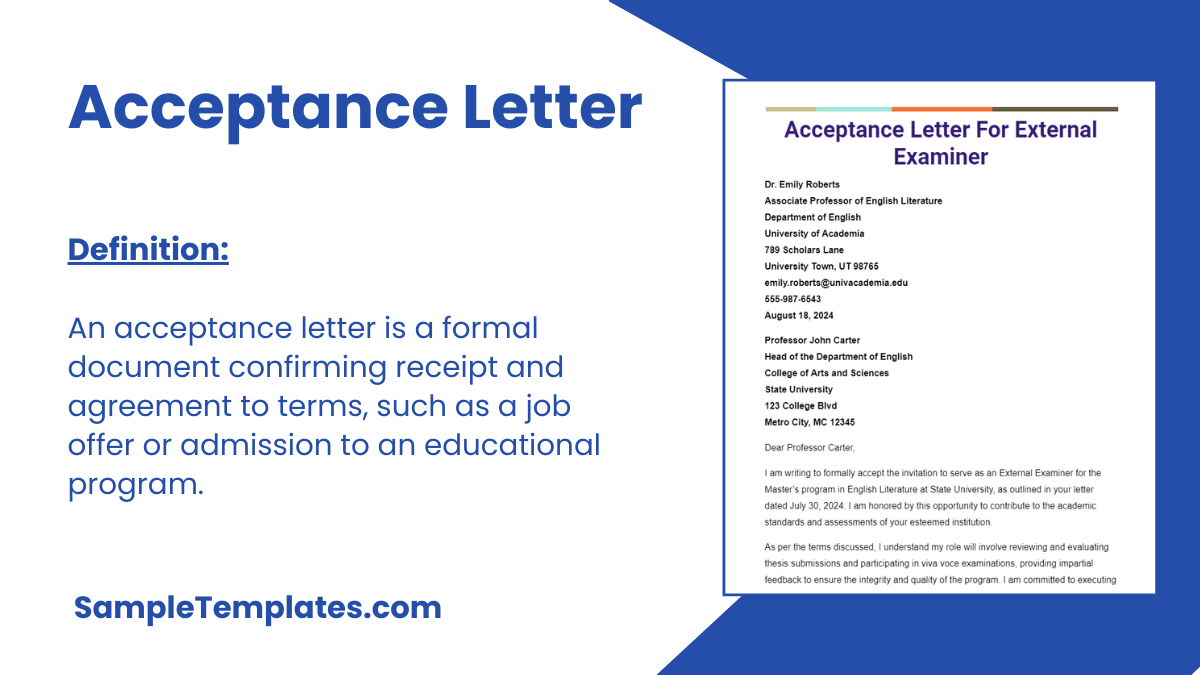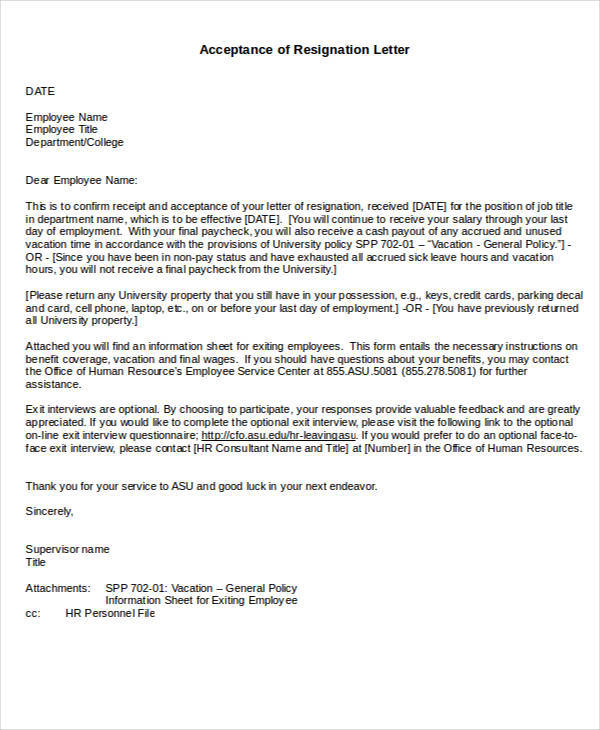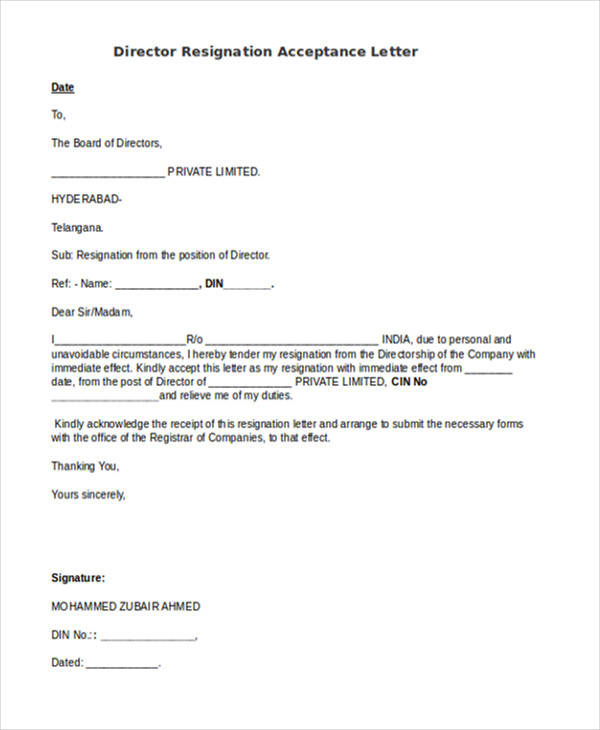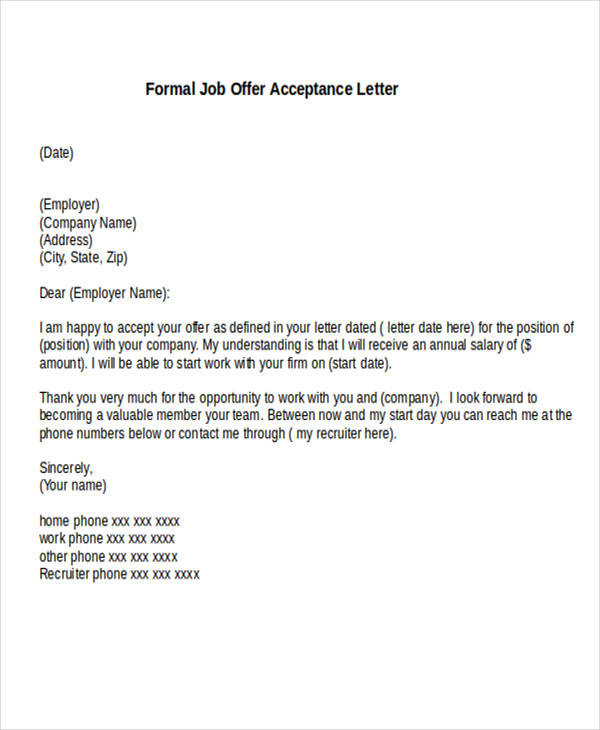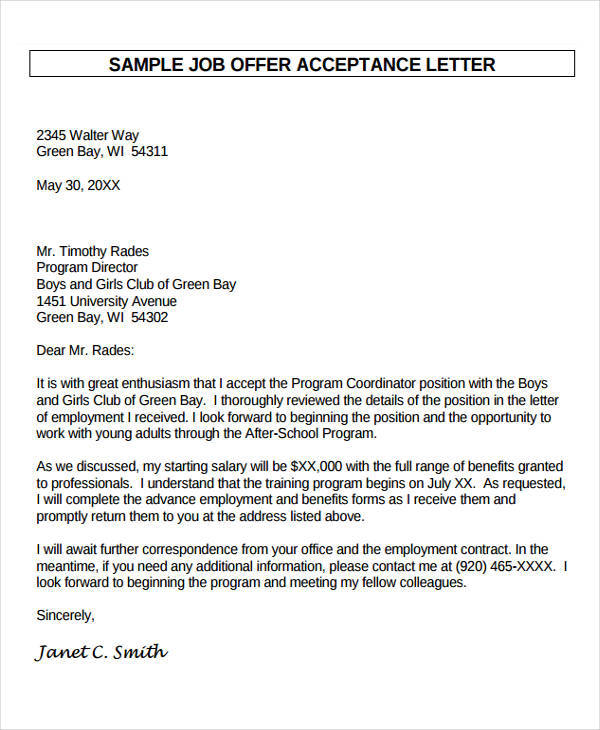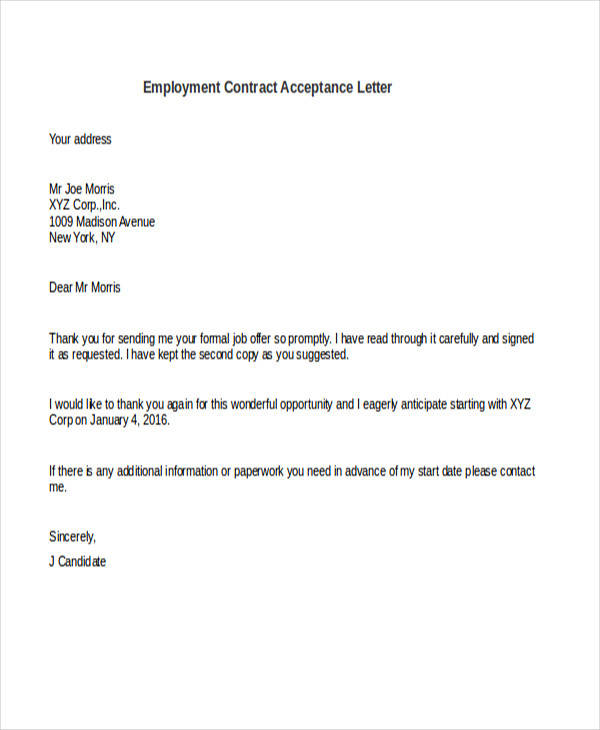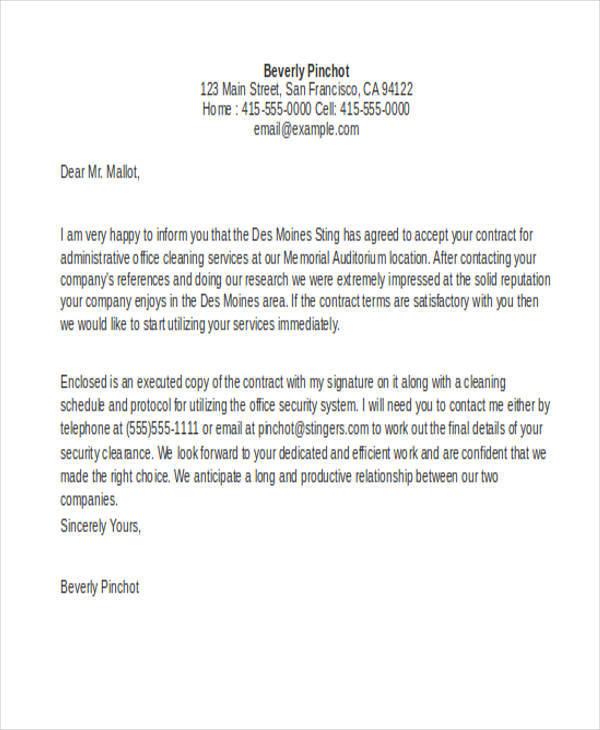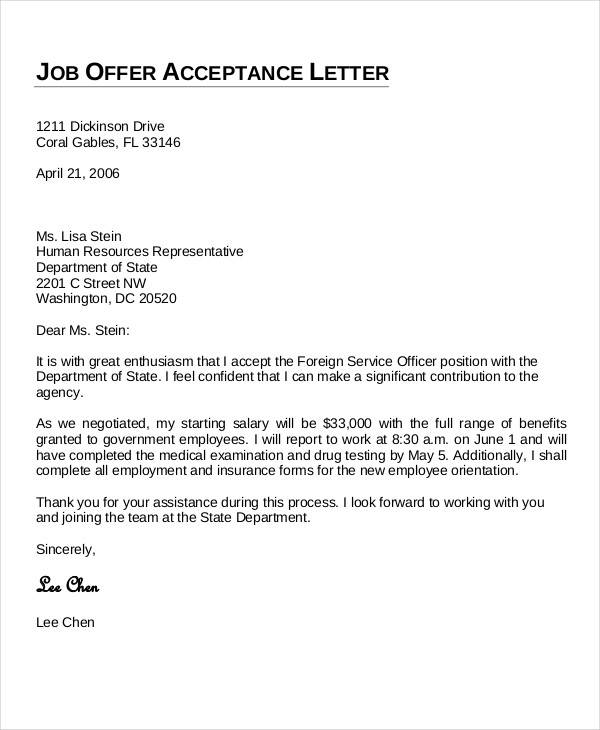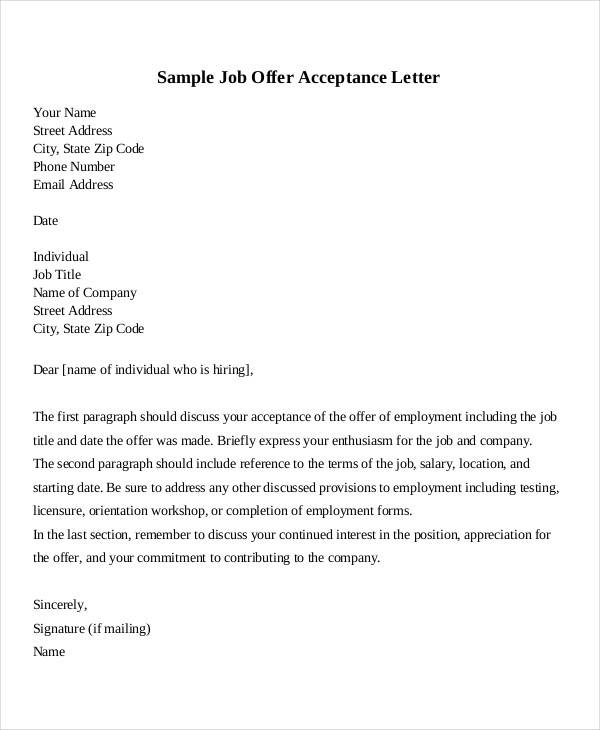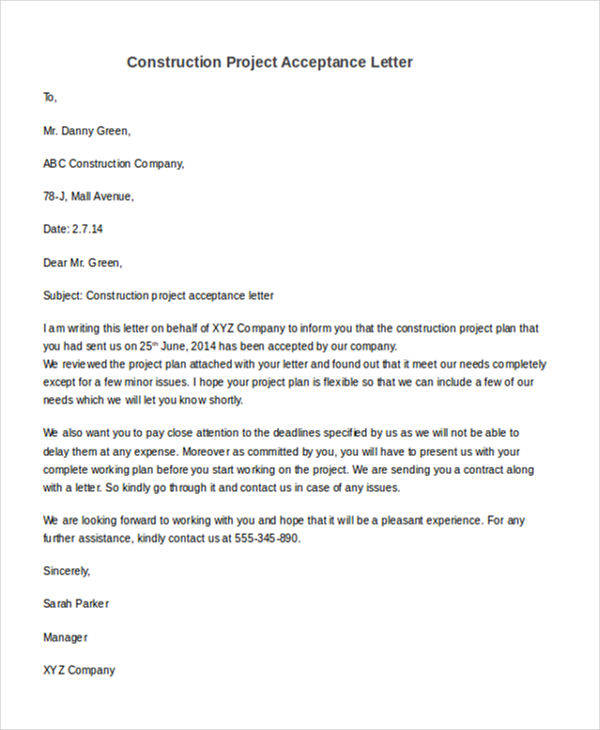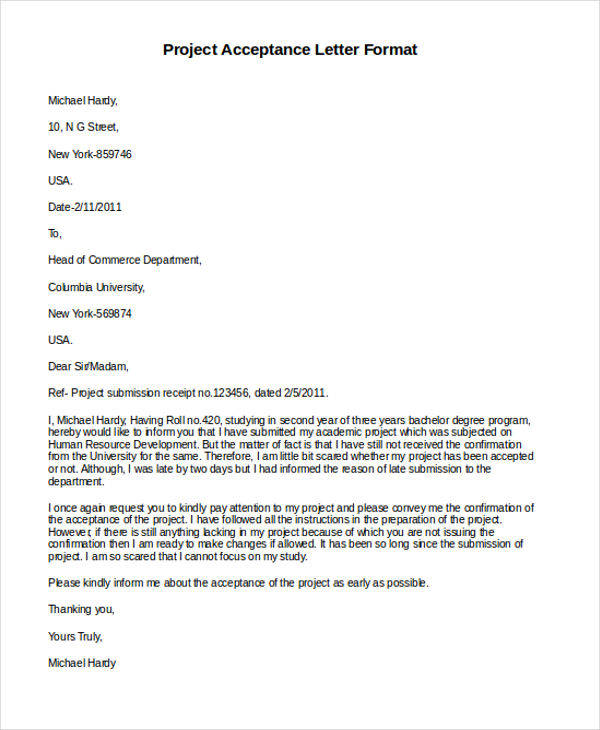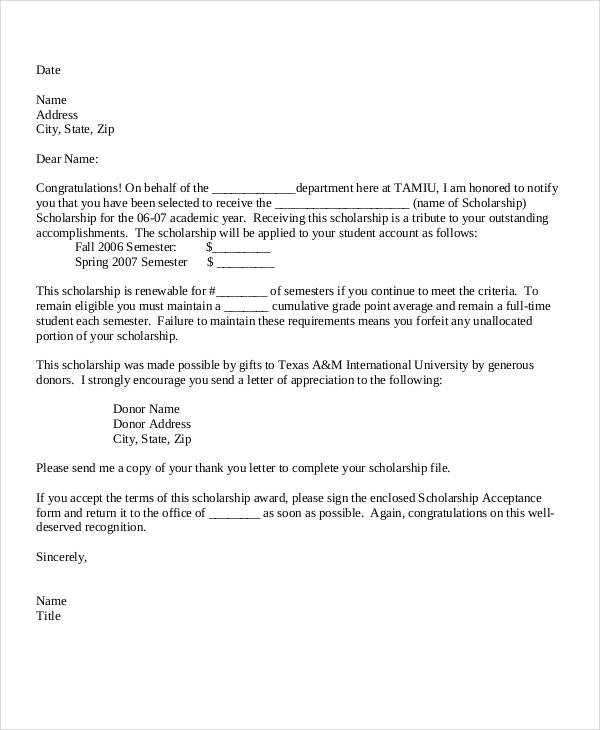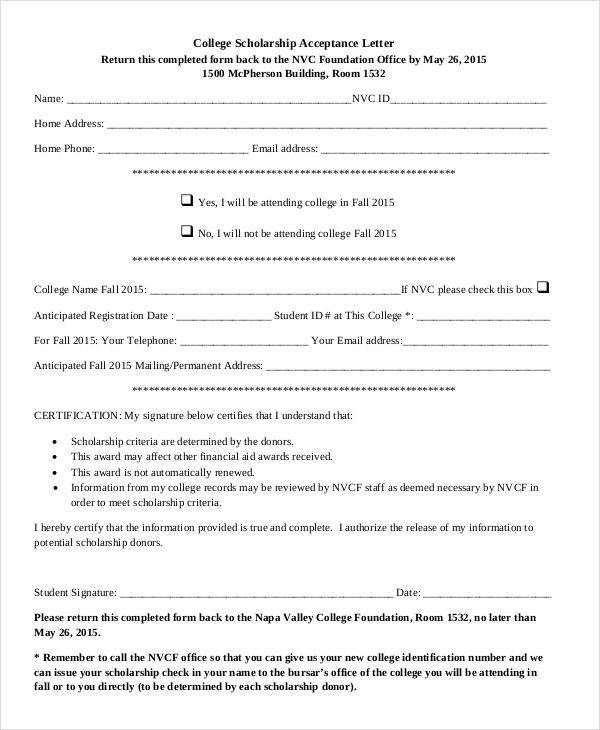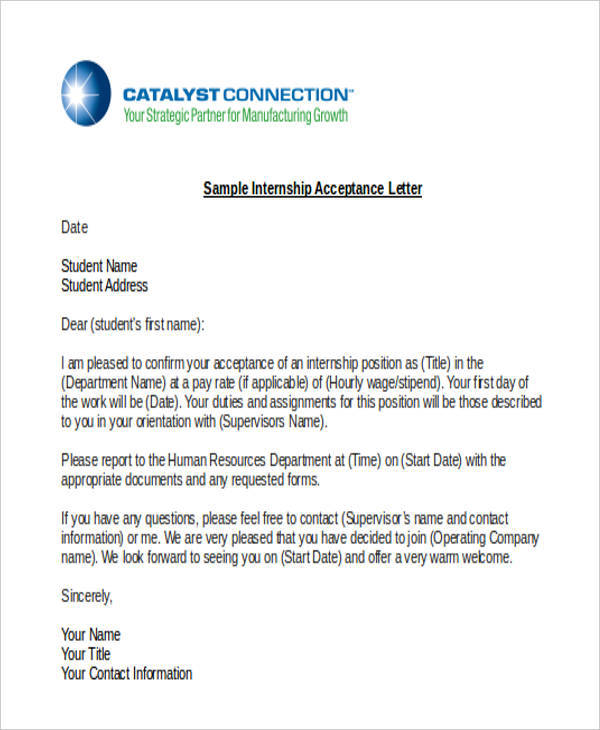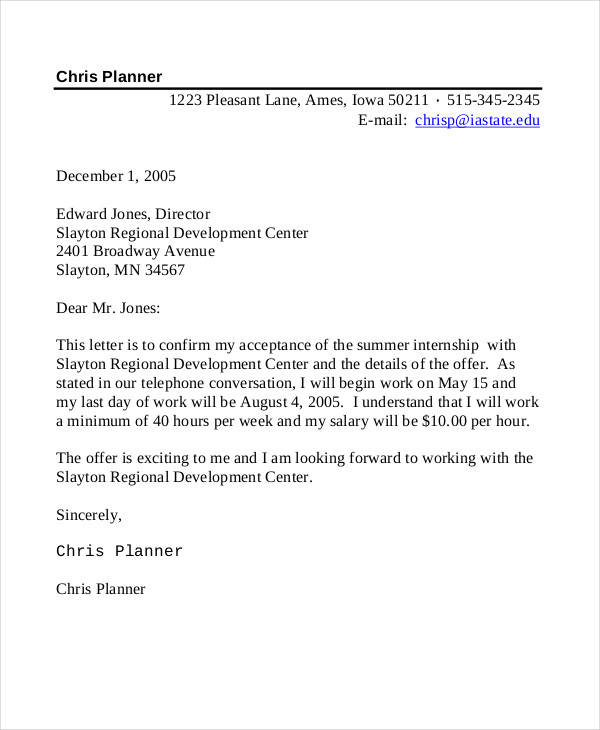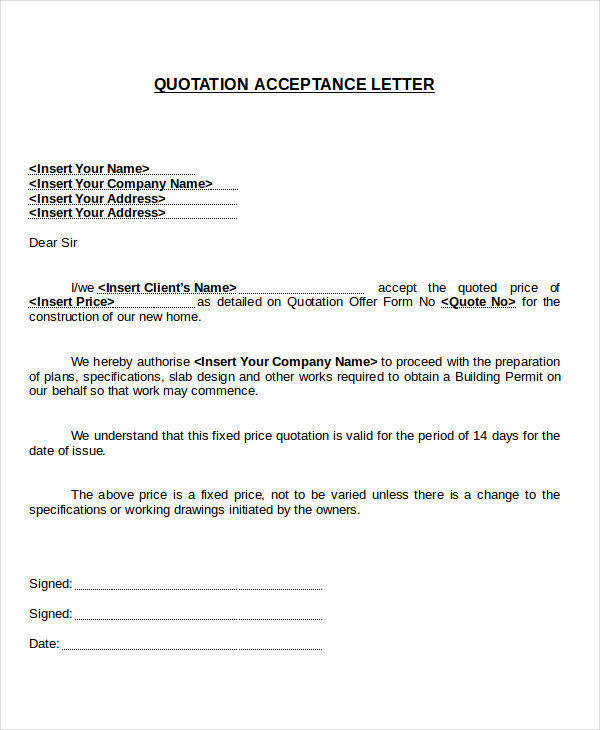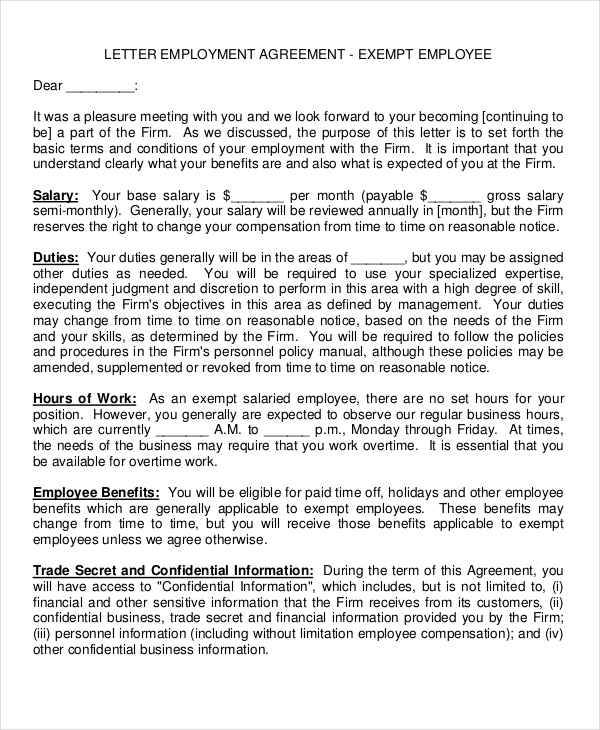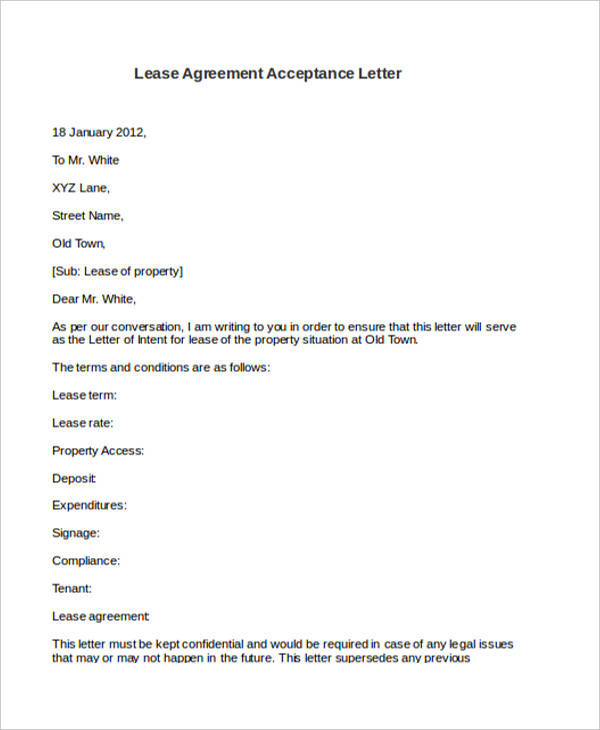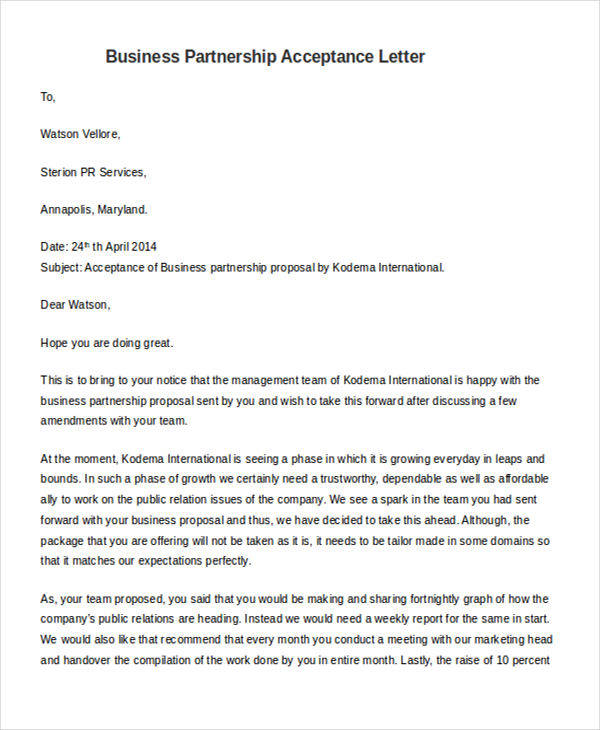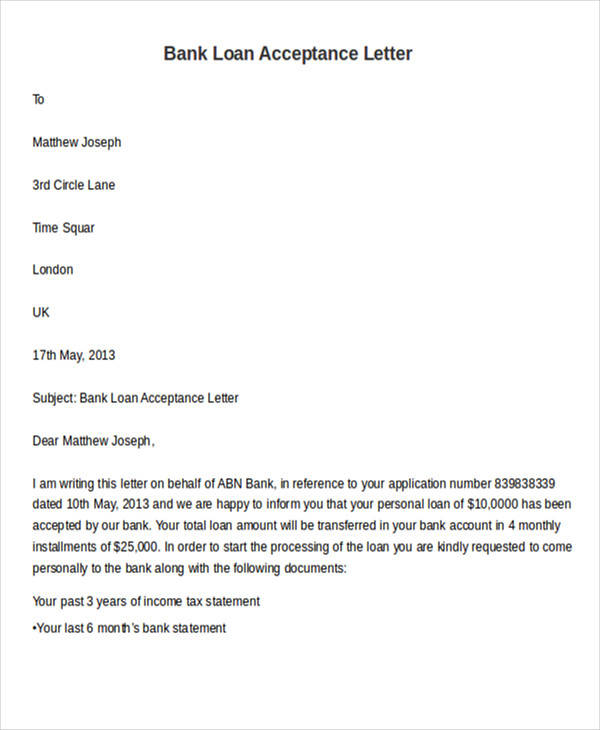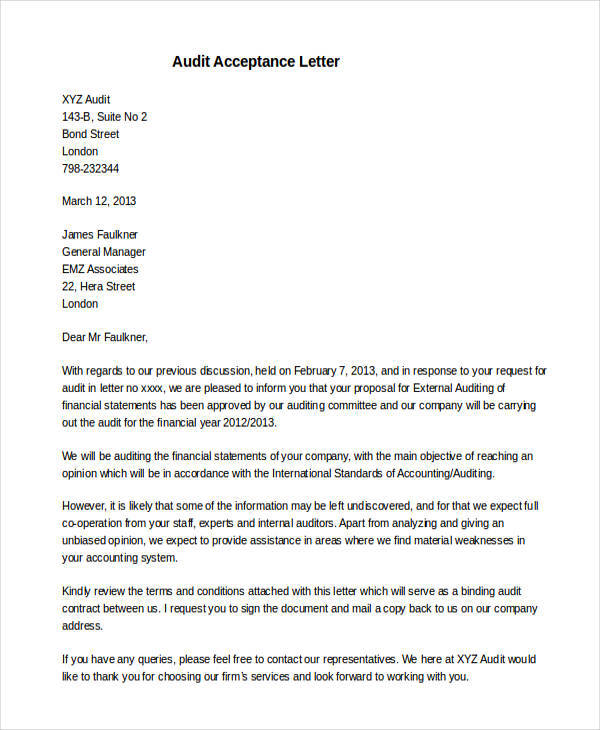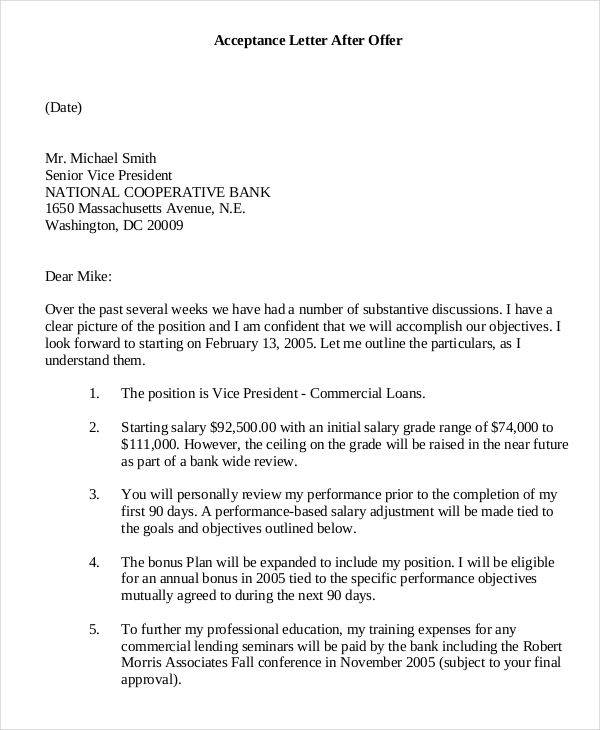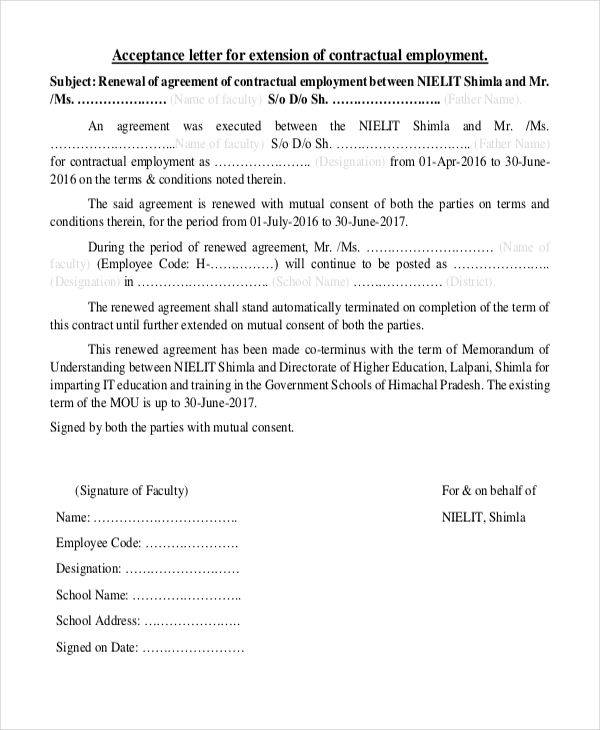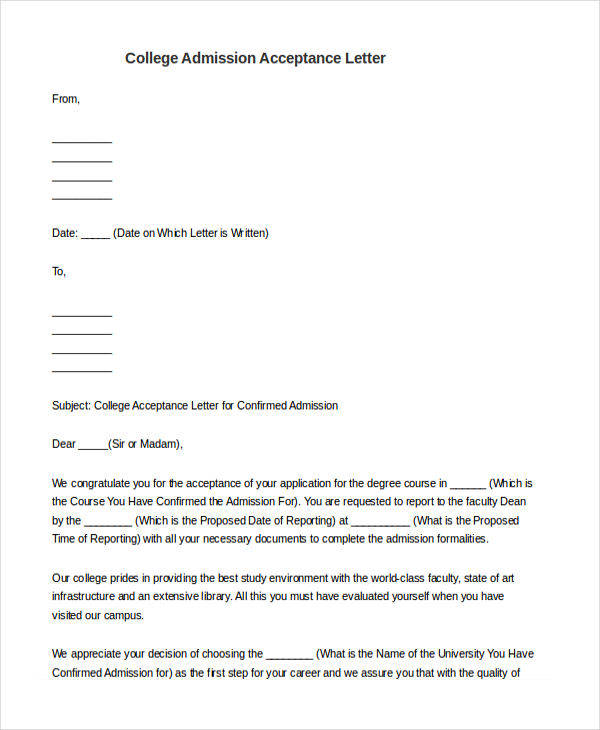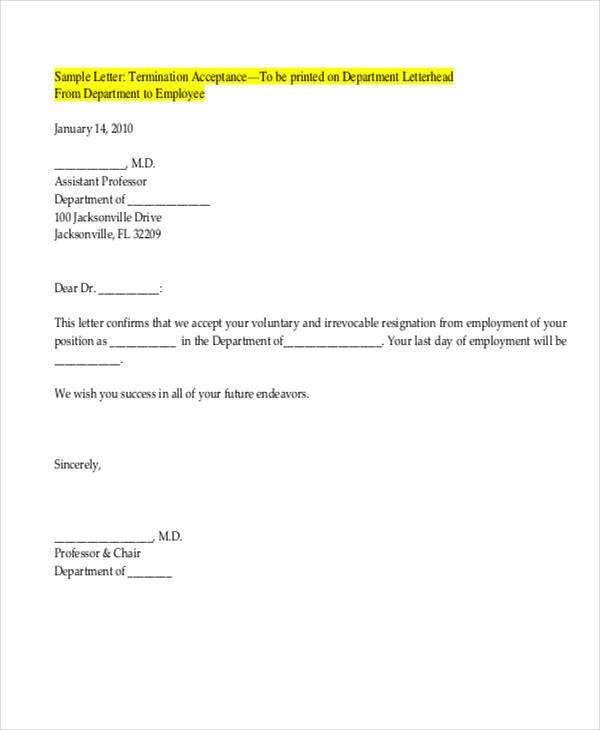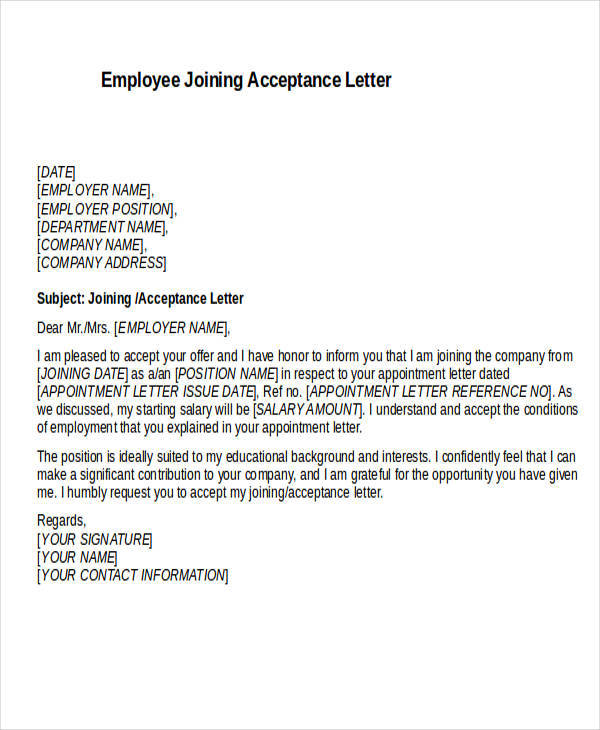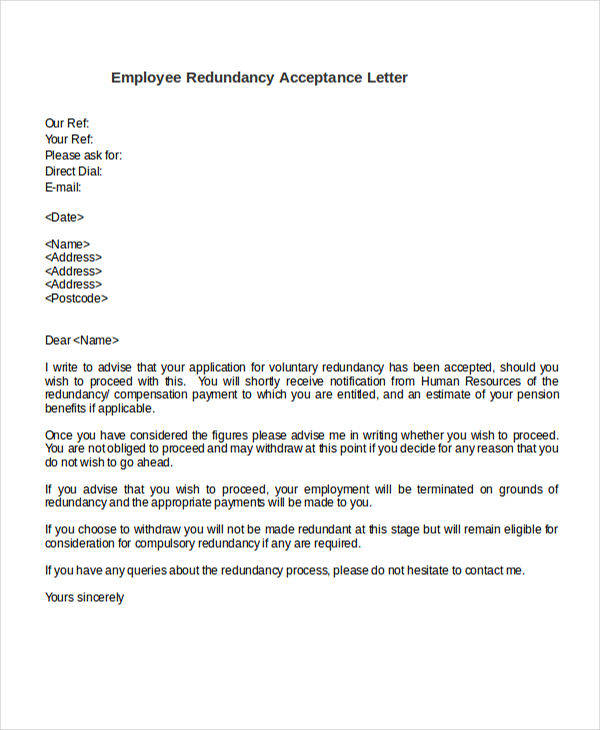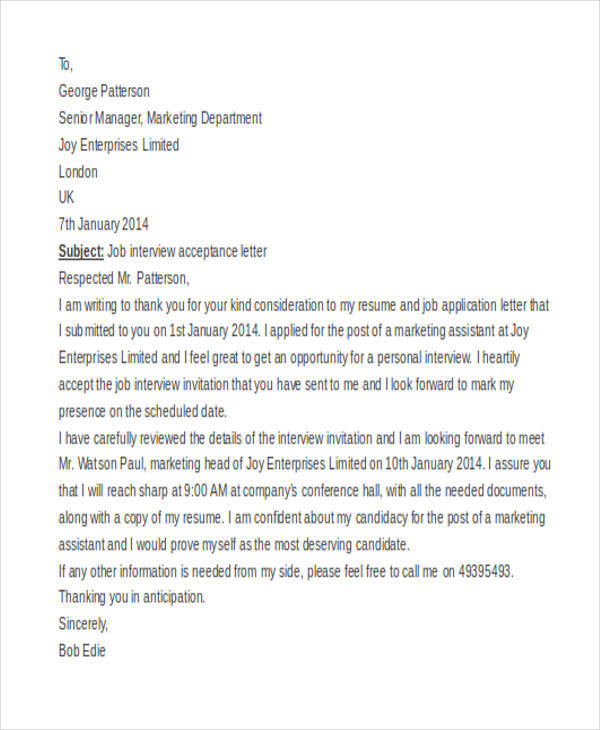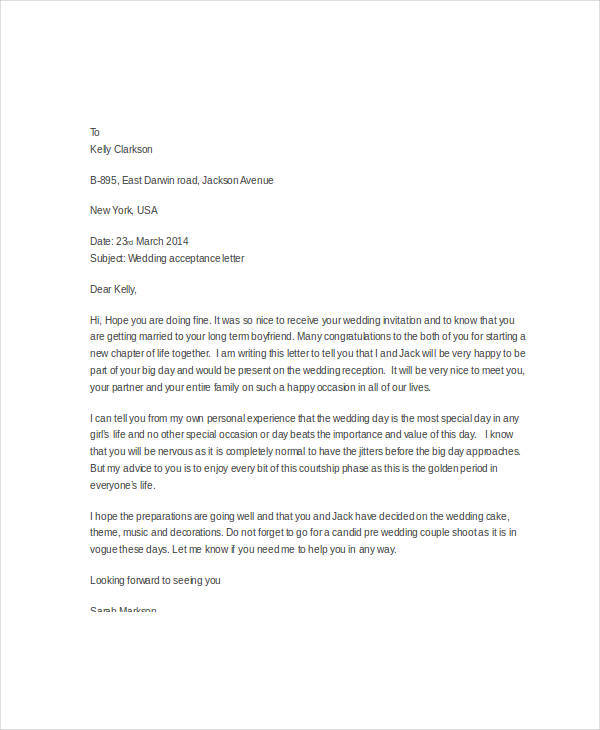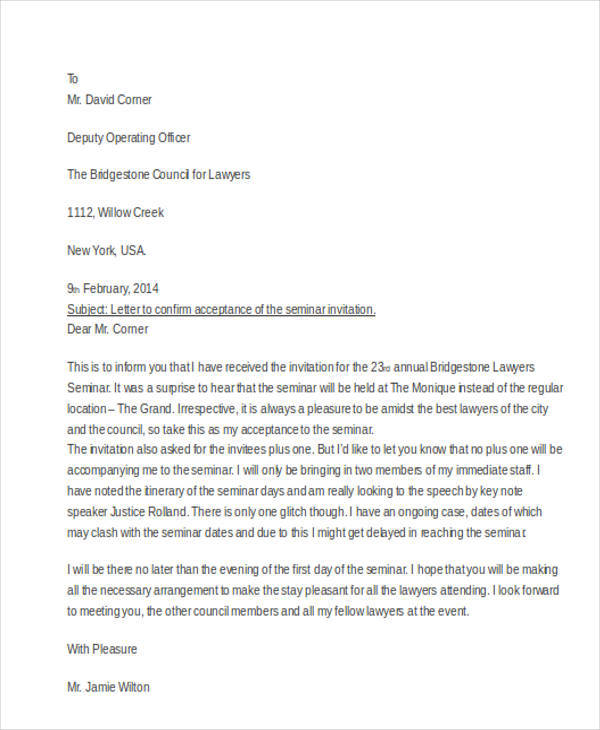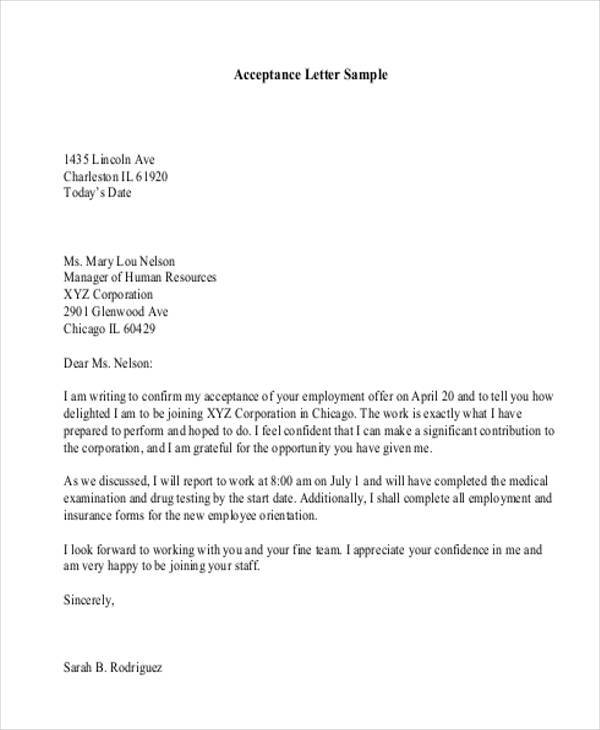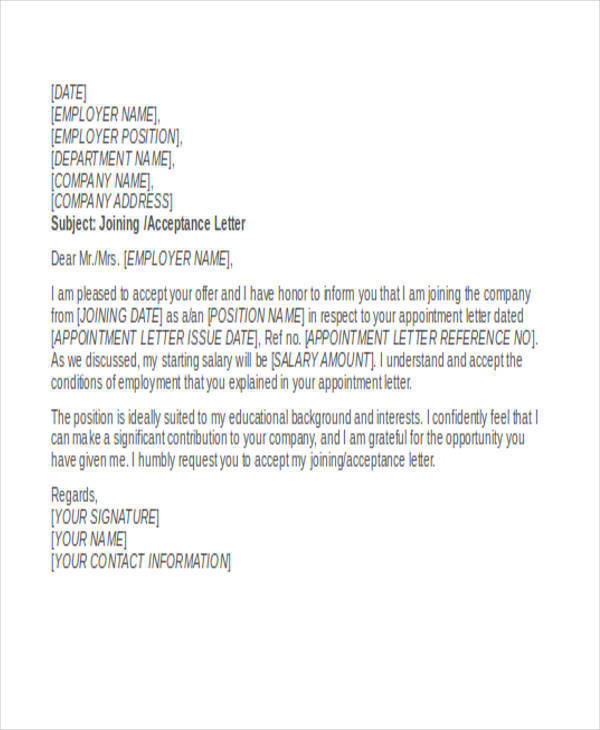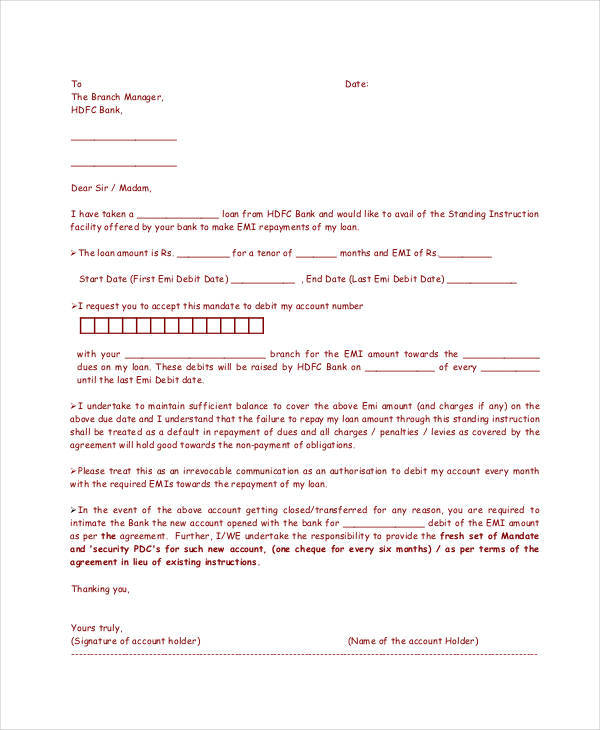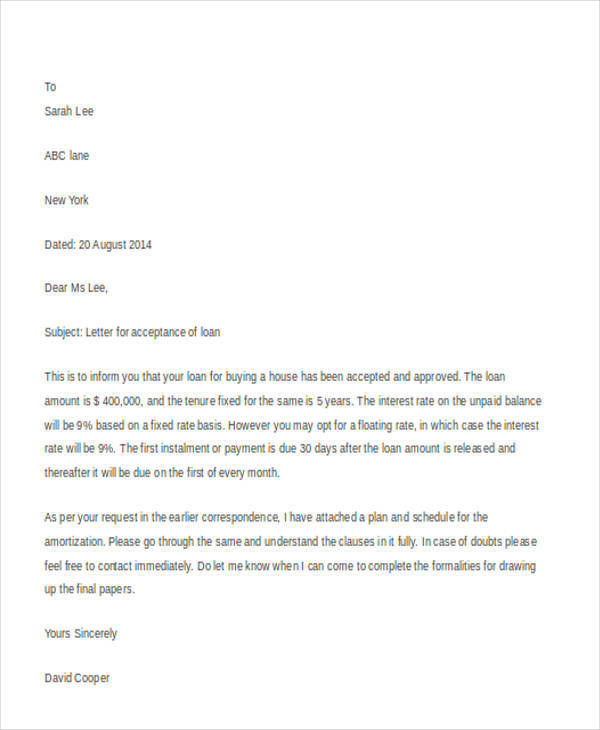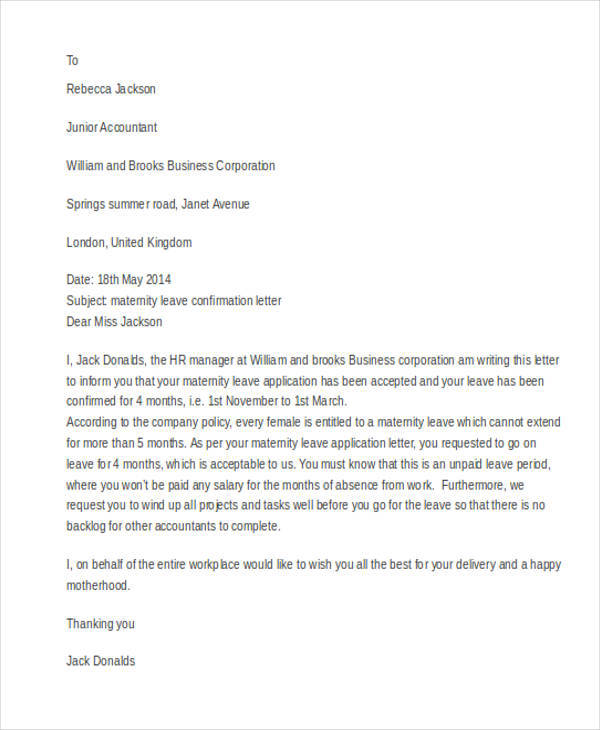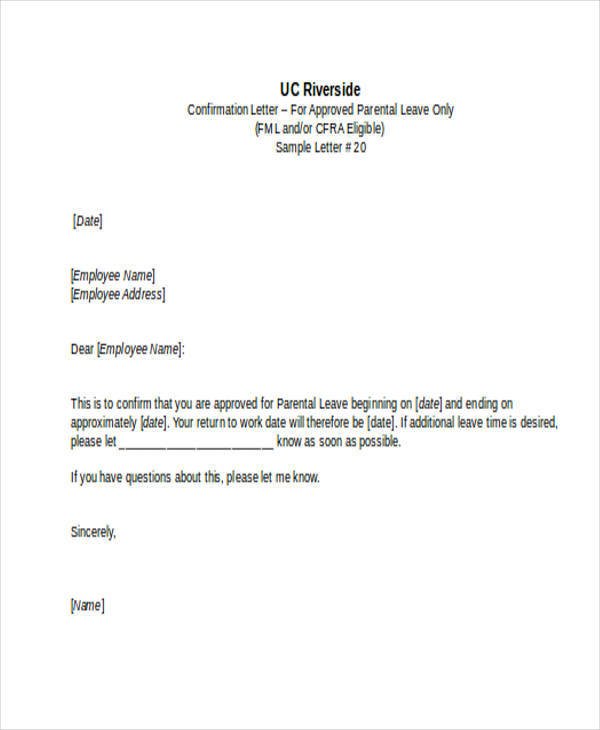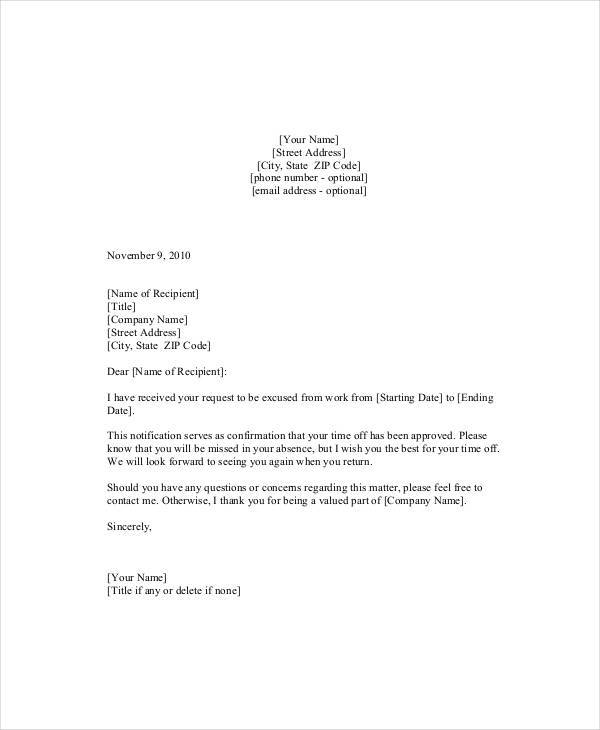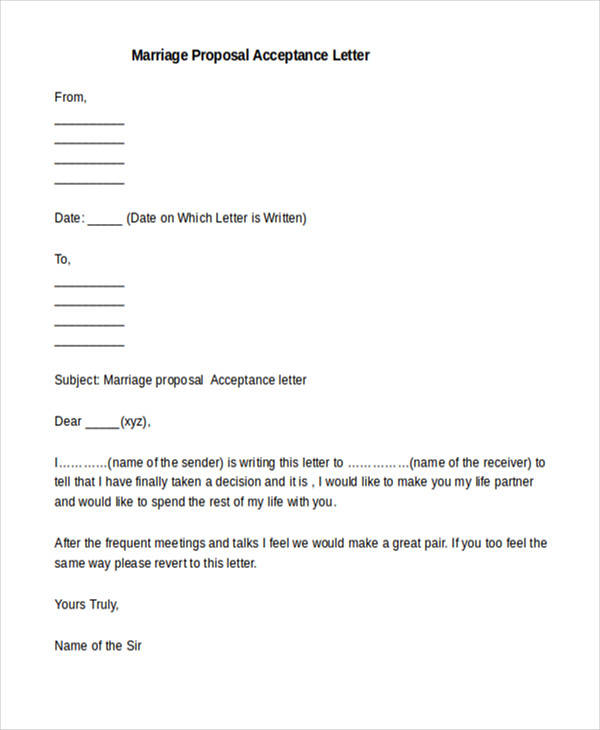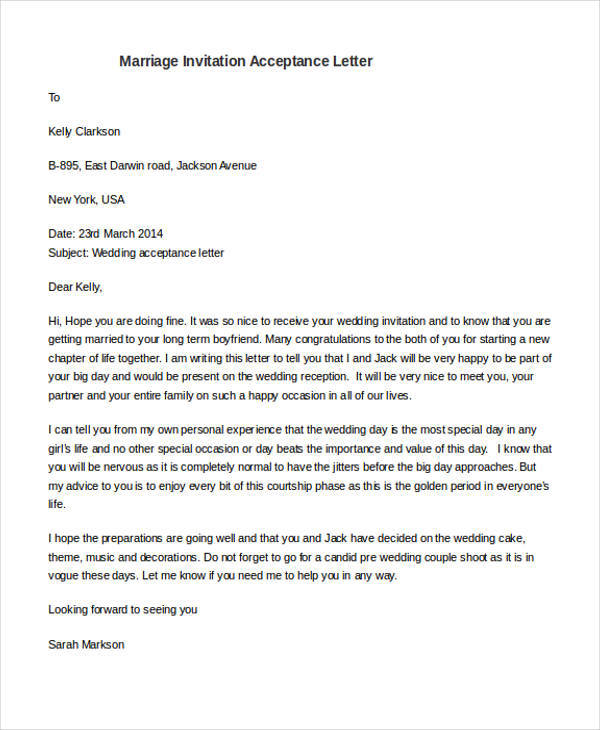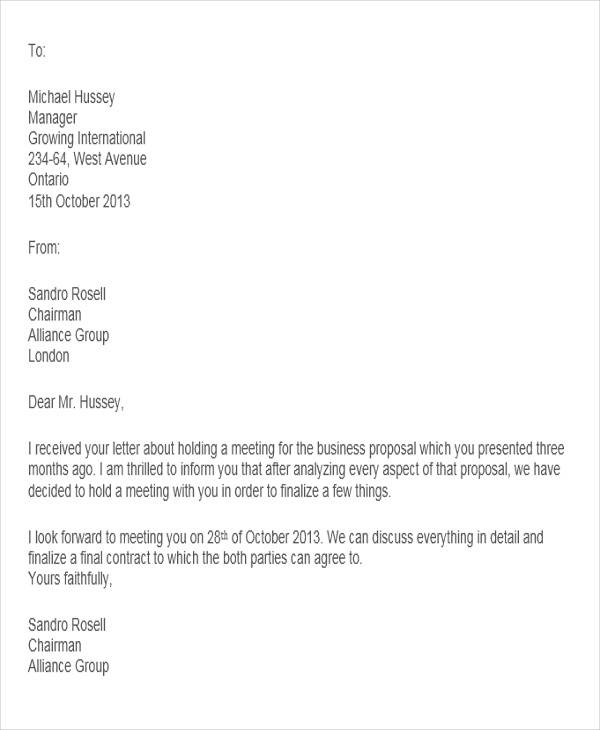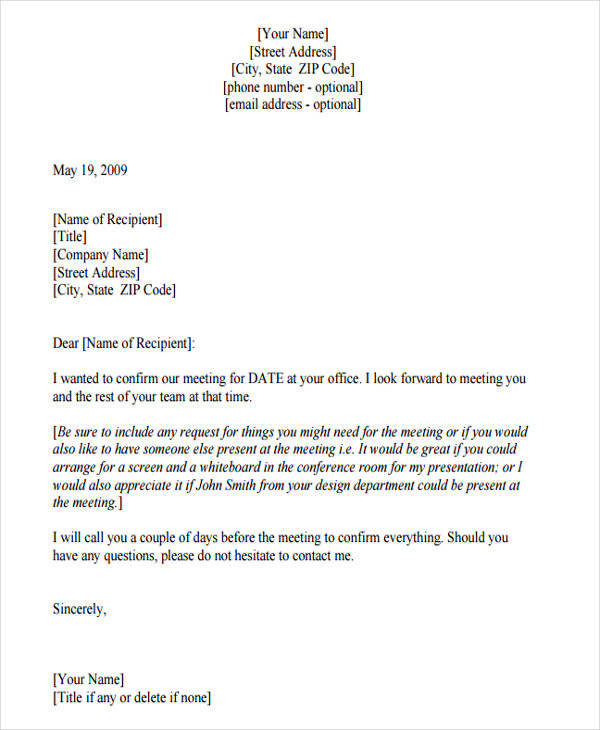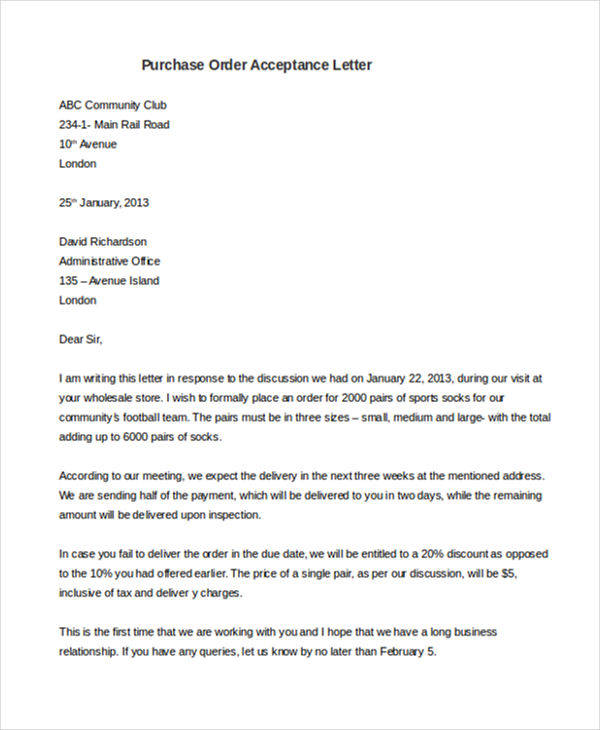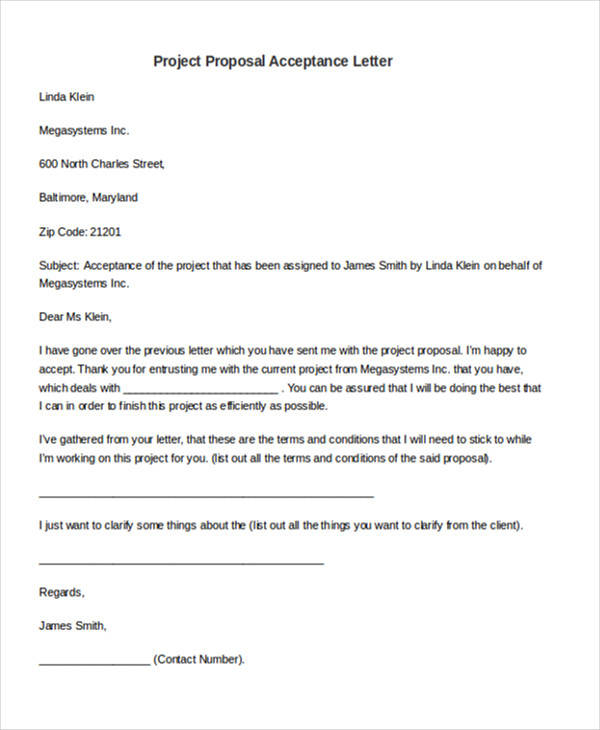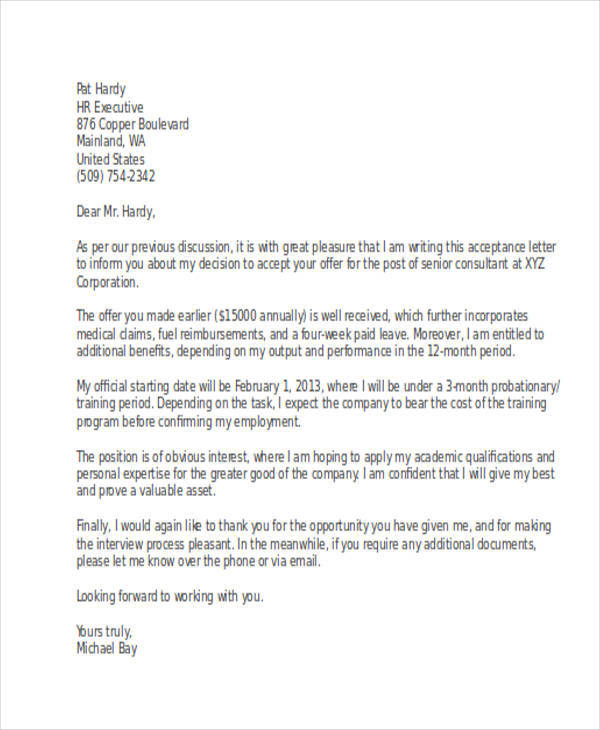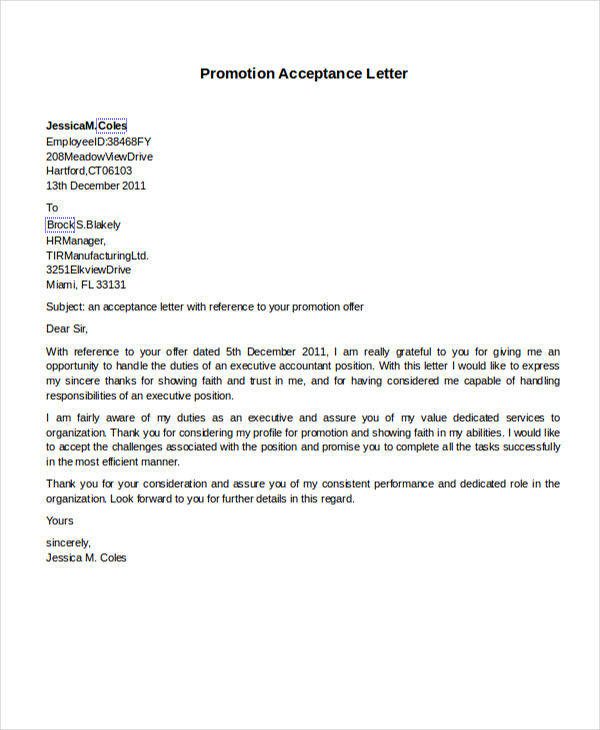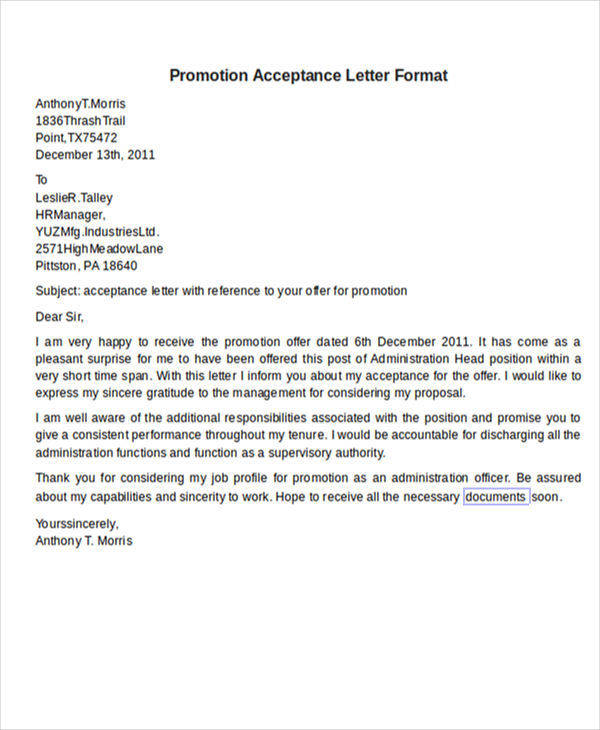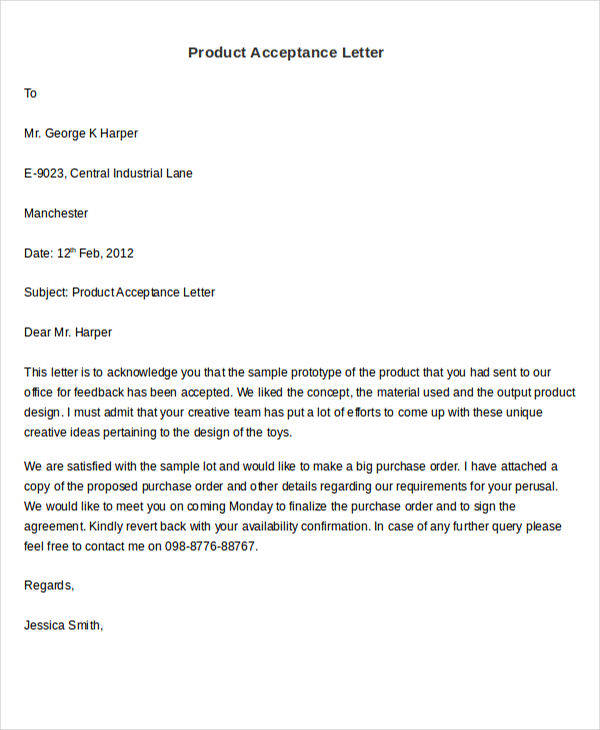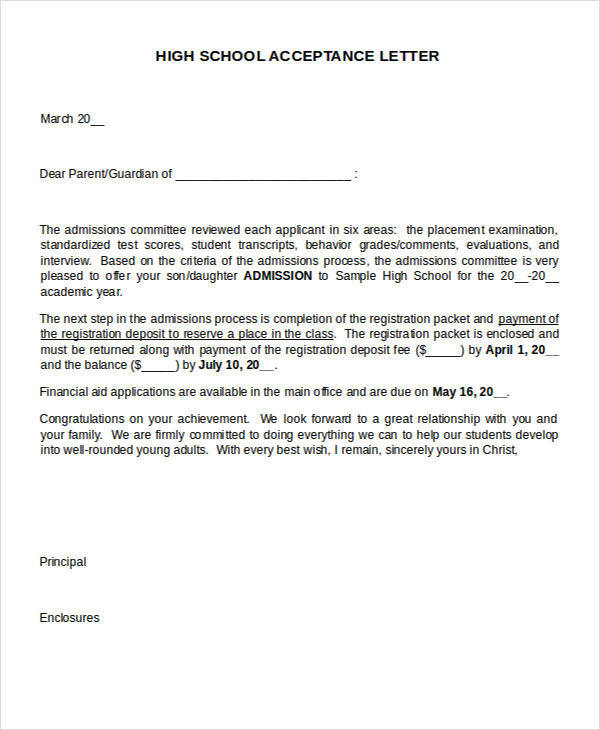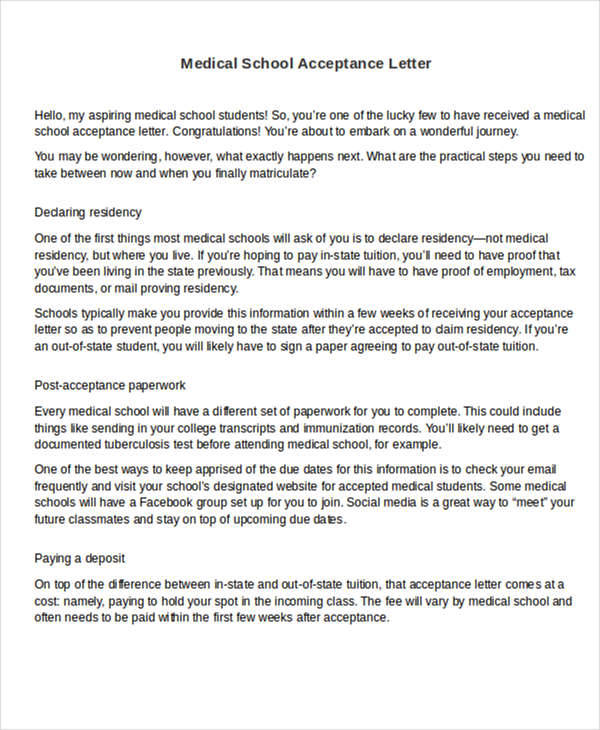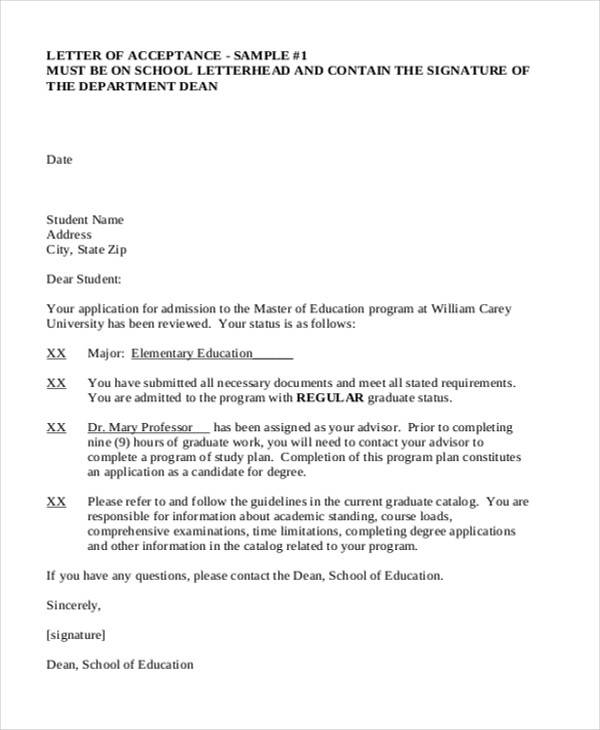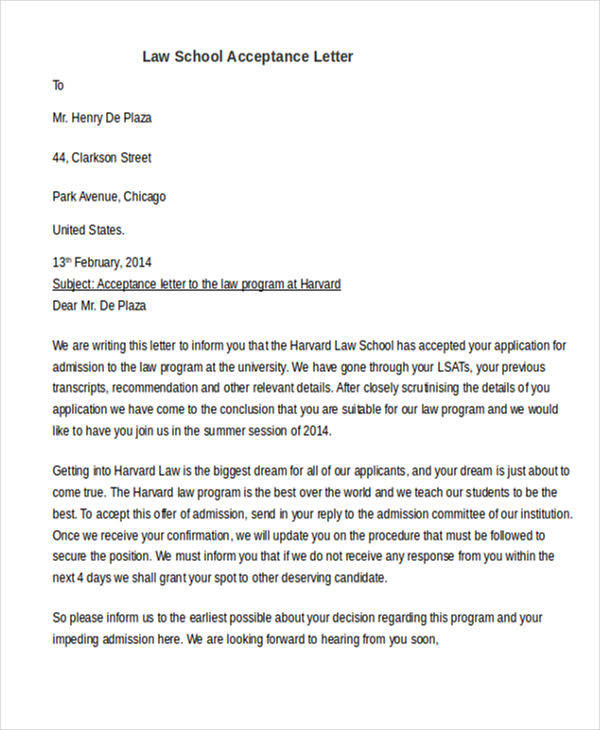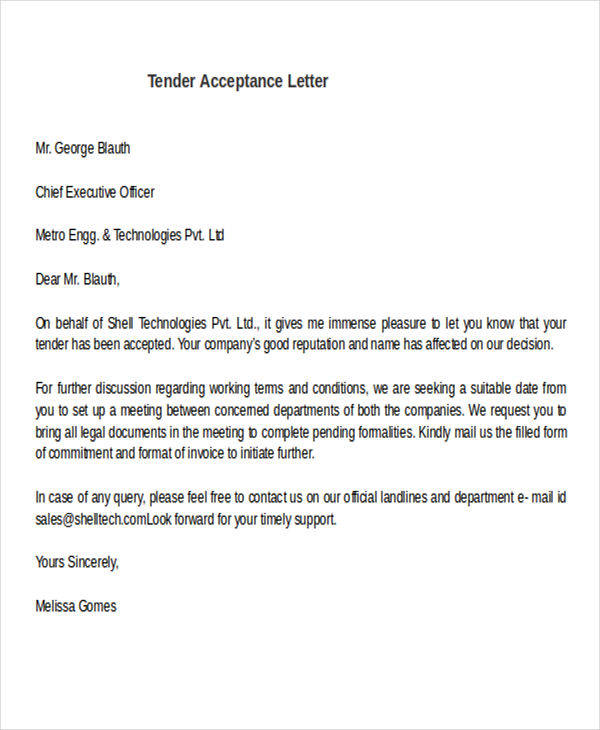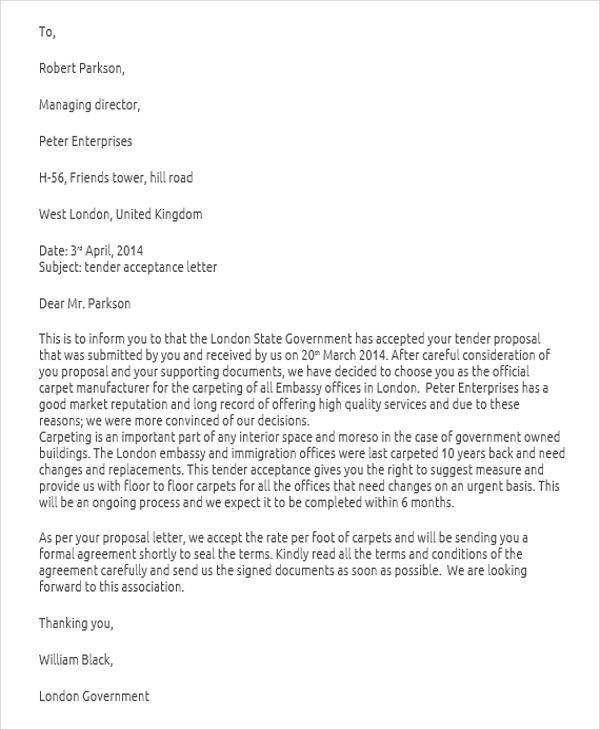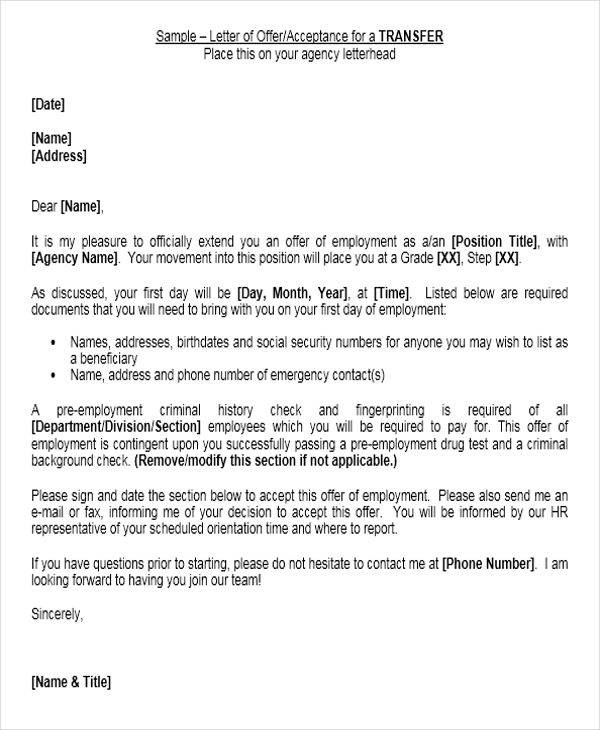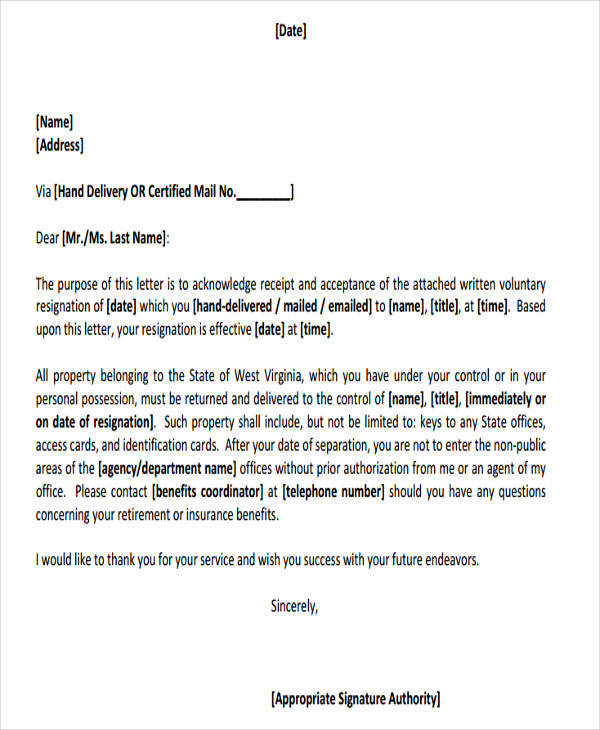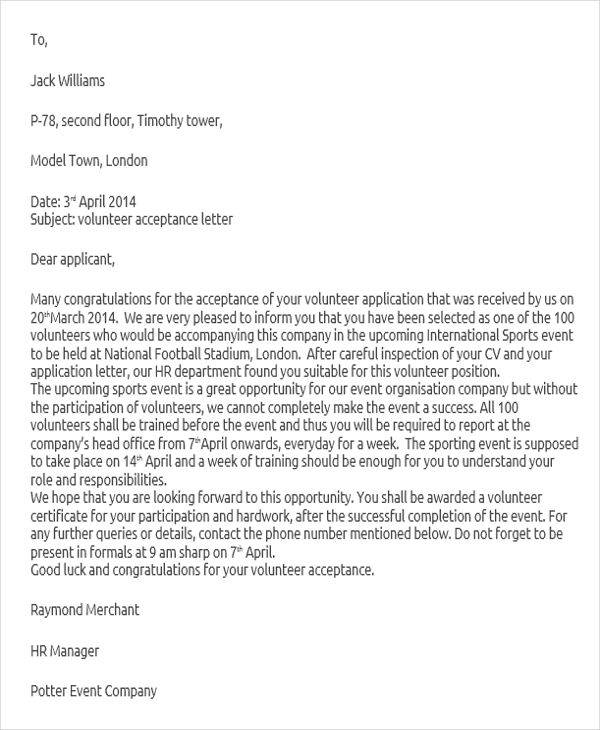It is people’s nature to seek for acceptance, whatever the kind. For many out there who want to remain professional while doing so, they prefer to send in an acceptance letter sample to the individuals who will no doubt be happy to receive. But, there are many types of acceptance letters outline and you may want to know what they are.
And on this list, we can help you. We have many different types of acceptance letters for you that you can choose from so you know the exact format. We also offer more letters other than just acceptance letters on our website. You may be interested in these appointment letters in word format that we have to offer.
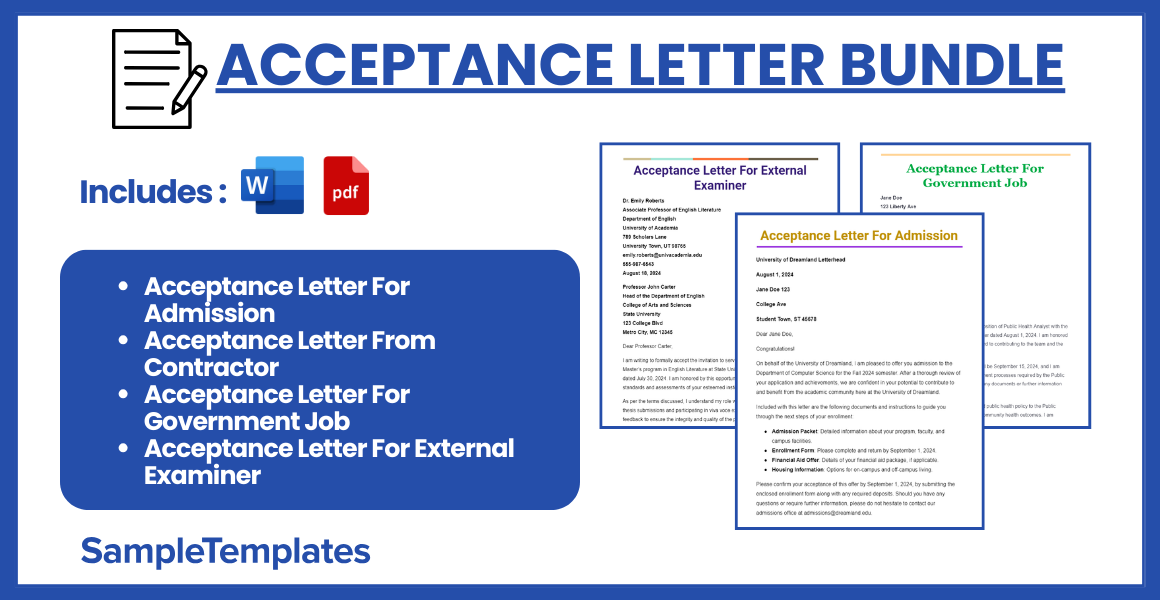
Download Acceptance Letter Bundle
Acceptance Letter For Admission
University of Dreamland Letterhead
August 1, 2024
Jane Doe 123
College Ave
Student Town, ST 45678
Dear Jane Doe,
Congratulations!
On behalf of the University of Dreamland, I am pleased to offer you admission to the Department of Computer Science for the Fall 2024 semester. After a thorough review of your application and achievements, we are confident in your potential to contribute to and benefit from the academic community here at the University of Dreamland.
Included with this letter are the following documents and instructions to guide you through the next steps of your enrollment:
- Admission Packet: Detailed information about your program, faculty, and campus facilities.
- Enrollment Form: Please complete and return by September 1, 2024.
- Financial Aid Offer: Details of your financial aid package, if applicable.
- Housing Information: Options for on-campus and off-campus living.
Please confirm your acceptance of this offer by September 1, 2024, by submitting the enclosed enrollment form along with any required deposits. Should you have any questions or require further information, please do not hesitate to contact our admissions office at [email protected].
We are excited about the possibility of you joining our vibrant academic community and are eagerly looking forward to your positive response.
Warmest regards,
Dr. Emily Smith
Director of Admissions
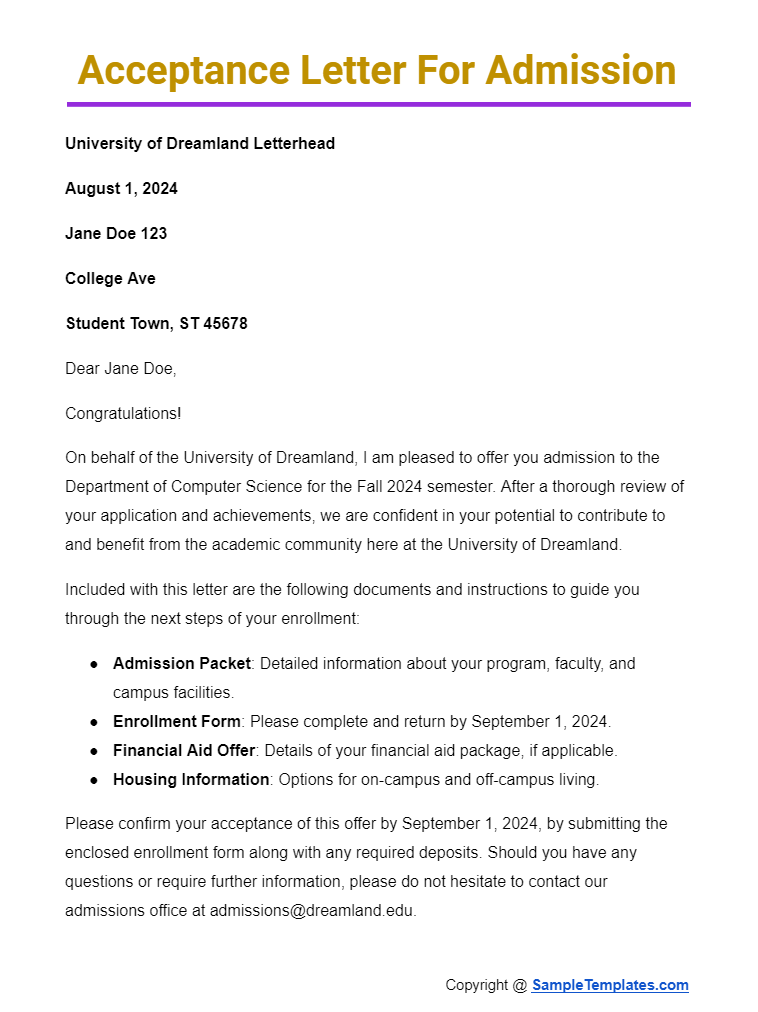
Acceptance Letter From Contractor
Dynamic Builders Company Letterhead
August 18, 2024
John Doe
Doe Enterprises
456 Business Rd
Commerce City, CC 12345
Dear Mr. Doe,
Thank you for choosing Dynamic Builders to handle your office renovation project. We are pleased to formally accept your offer as outlined in the proposal dated August 1, 2024, and look forward to collaborating with your team.
As discussed, here are the key terms of our agreement:
- Project Description: Complete renovation of the existing office space, including new flooring, wall partitions, and updated electrical systems, aimed at enhancing the functional layout and aesthetic appeal of the space.
- Start Date: September 15, 2024
- Completion Date: December 15, 2024
- Total Cost: $120,000
- Payment Terms: 50% upfront, 25% midway through the project, 25% upon completion
- Points of Contact: Project Manager – Tom Harris, Doe Enterprises Liaison – Sarah Lee
We will proceed with the necessary preparations to commence work on the agreed start date. Our team will ensure that all work is performed to the highest standards and in compliance with relevant regulations and guidelines. We will keep you regularly updated on our progress.
Please sign and return the attached copy of this letter as a confirmation of the terms and your agreement to proceed. If there are any further details or adjustments to discuss, please feel free to contact me directly at [email protected].
Thank you once again for this opportunity. We are committed to delivering a successful project and surpassing your expectations.
Warm regards,
Tom Harris
Project Manager
Dynamic Builders
[email protected]
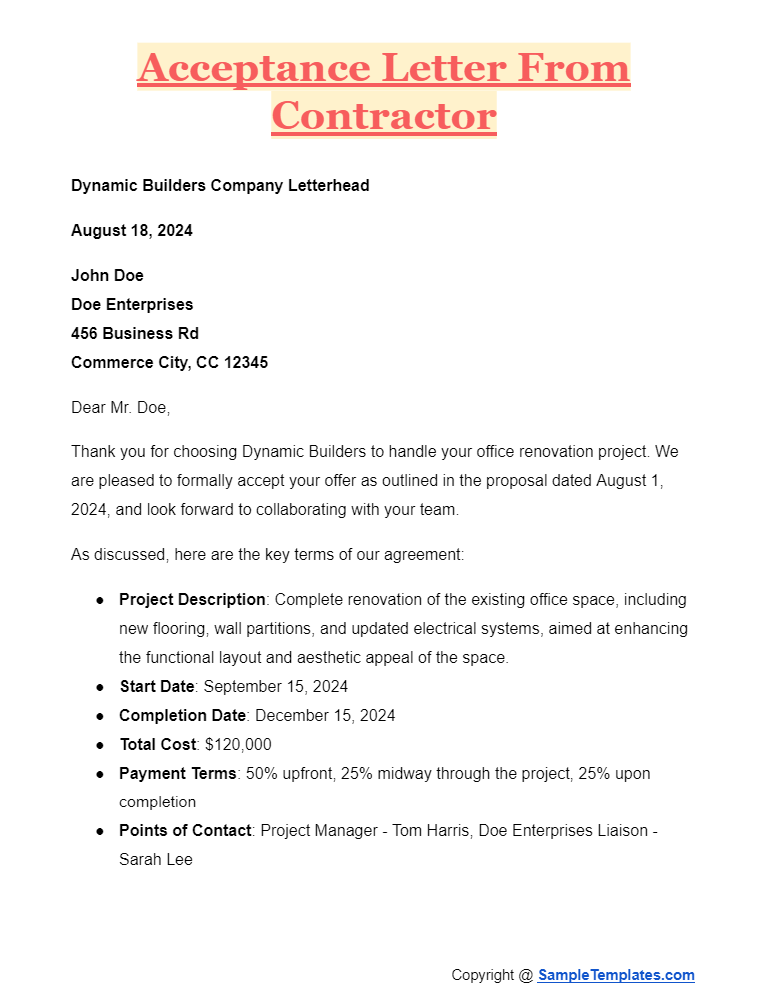
Acceptance Letter For Government Job
Jane Doe
123 Liberty Ave
Capital City, State, 10001
[email protected]
555-123-4567
August 18, 2024
Mr. John Smith
Human Resources Manager
Department of Health Services
Public Health Agency
456 Government Plaza
Capital City, State, 10001
Dear Mr. Smith,
I am writing to formally accept the offer for the position of Public Health Analyst with the Public Health Agency, as outlined in the offer letter dated August 1, 2024. I am honored by the trust placed in my abilities and look forward to contributing to the team and the overall mission of the Public Health Agency.
As discussed, I understand that my start date will be September 15, 2024, and I am prepared to complete all necessary pre-employment processes required by the Public Health Agency. Please let me know if there are any documents or further information you need from me prior to this date.
I am eager to bring my skills in data analysis and public health policy to the Public Health Agency and to work towards improving community health outcomes. I am committed to upholding the standards and expectations of your agency and am excited about the opportunities for growth and contribution.
Please confirm the receipt of this acceptance letter and any further steps I need to complete before my starting date.
Thank you once again for this opportunity. I look forward to working with you and the Department of Health Services team.
Warm regards,
Jane Doe
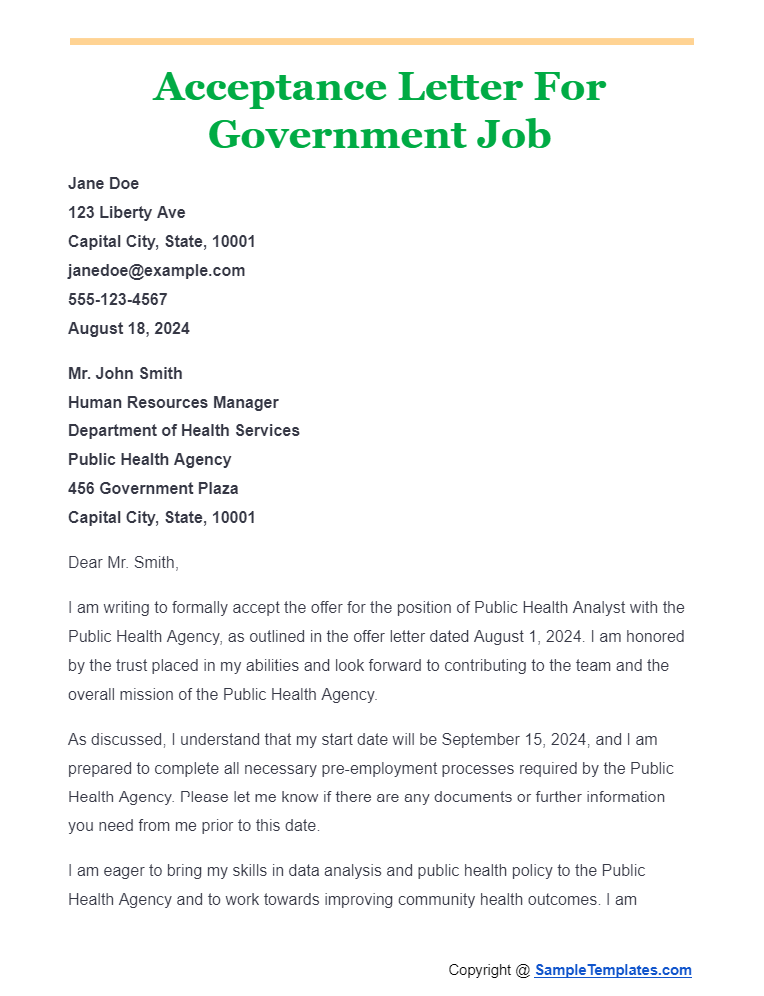
Acceptance Letter For External Examiner
Dr. Emily Roberts
Associate Professor of English Literature
Department of English
University of Academia
789 Scholars Lane
University Town, UT 98765
[email protected]
555-987-6543
August 18, 2024
Professor John Carter
Head of the Department of English
College of Arts and Sciences
State University
123 College Blvd
Metro City, MC 12345
Dear Professor Carter,
I am writing to formally accept the invitation to serve as an External Examiner for the Master’s program in English Literature at State University, as outlined in your letter dated July 30, 2024. I am honored by this opportunity to contribute to the academic standards and assessments of your esteemed institution.
As per the terms discussed, I understand my role will involve reviewing and evaluating thesis submissions and participating in viva voce examinations, providing impartial feedback to ensure the integrity and quality of the program. I am committed to executing these duties with the utmost professionalism and adherence to the academic guidelines set forth by State University.
I am aware that my term as an External Examiner will commence on September 1, 2024, and conclude on August 31, 2027, during which I will provide annual reports and attend examination boards as required.
Please confirm the receipt of this acceptance letter and any further administrative or procedural steps I need to complete prior to my official start date. Additionally, I would appreciate any specific guidelines, documents, or materials that would assist me in fulfilling my responsibilities effectively.
Thank you once again for this opportunity. I look forward to contributing positively to the academic success of your students and to the reputation of State University.
Warm regards,
[Dr. Emily Roberts]
[Associate Professor of English Literature]
[555-987-6543]
[[email protected]]
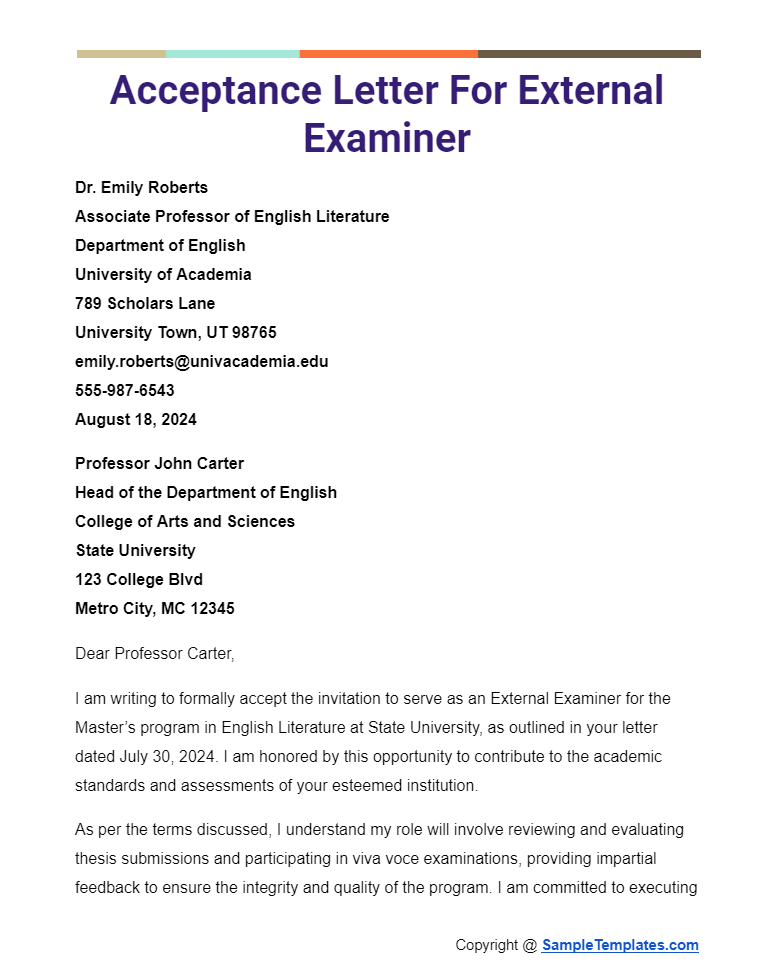
Browse More Templates On Acceptance Letter
College Acceptance Letter Template
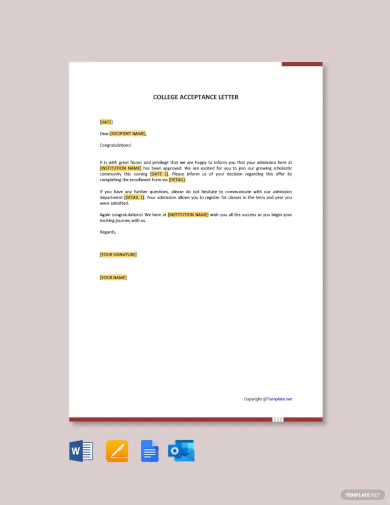
Property Offer Acceptance Letter Template
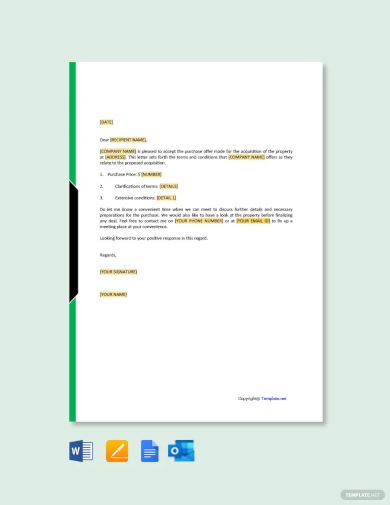
College Admission Acceptance Letter Template
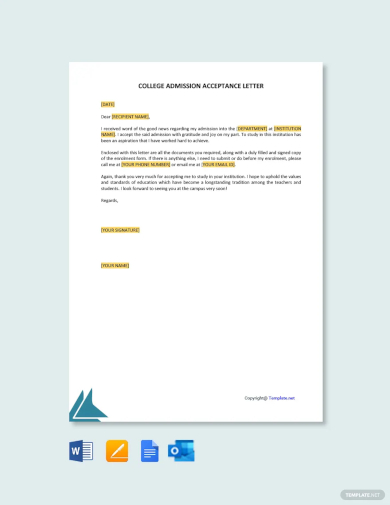
Contract Termination Acceptance Letter Template
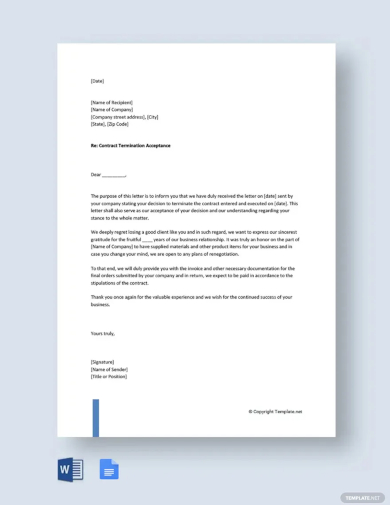
Internship Acceptance Letter from Company to Student Template
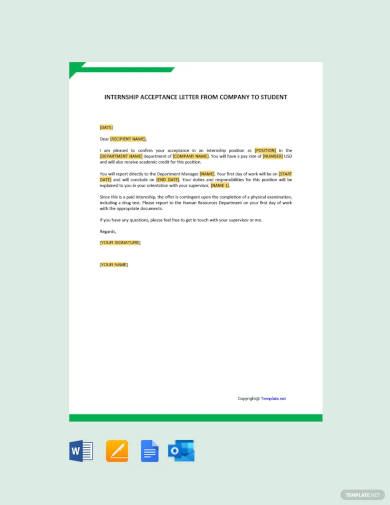
Job Offer Acceptance Letter Template
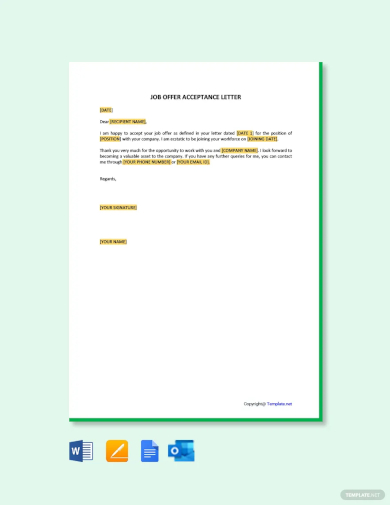
Acceptance Letter Format Template
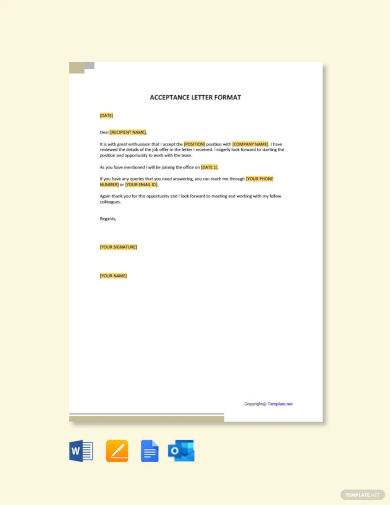
Internship Acceptance Letter Template
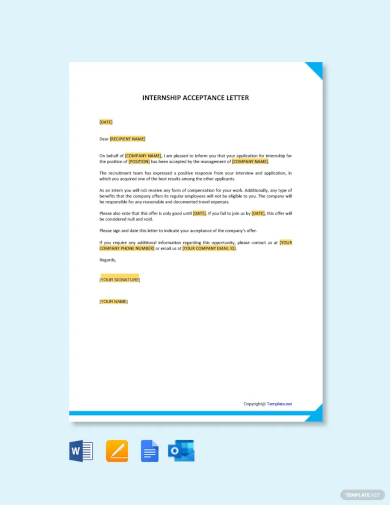
How to Write a Acceptance Letter?
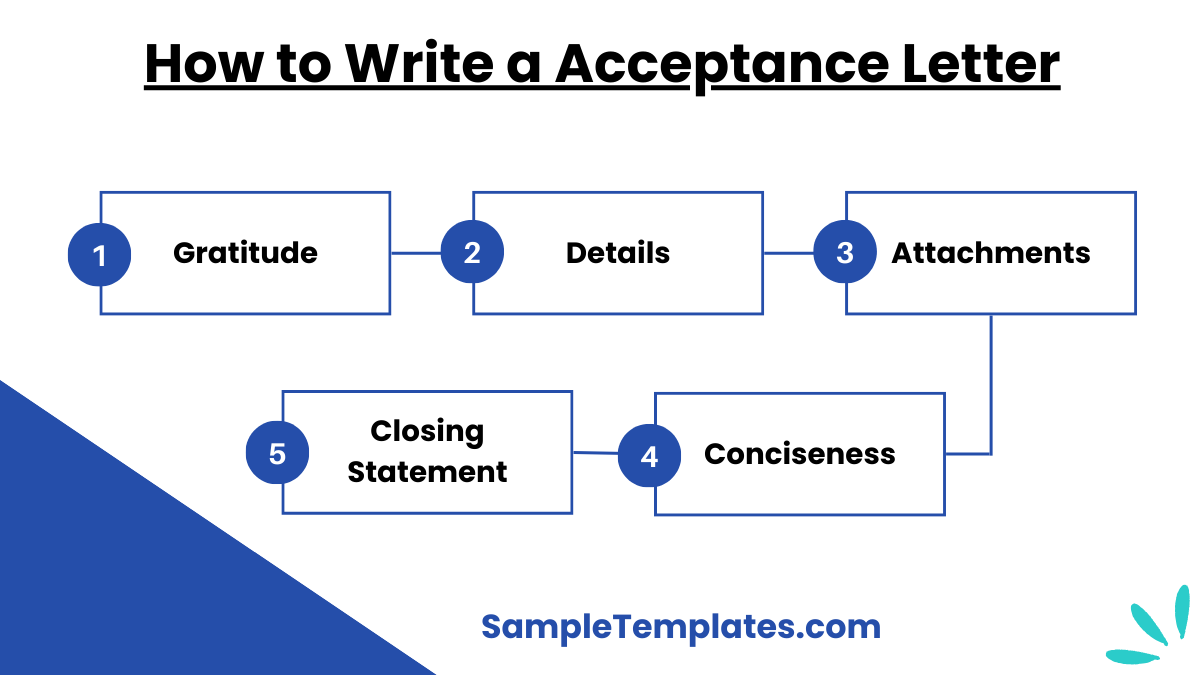
- Express Gratitude:
- Start by expressing your appreciation for the opportunity, offer, or invitation. This sets a positive tone for the rest of the letter and shows your enthusiasm and courtesy.
- Confirm Details:
- Clearly state what you are accepting, including any specific terms or details such as the position title, start date, salary, and any other pertinent conditions or aspects of the agreement. This helps prevent any misunderstandings about what has been agreed upon. You can also see more on Job Acceptance Letter.
- Mention Any Attachments or Required Actions:
- If you need to include any attachments, such as signed documents, contracts, or forms, mention these in your letter. Also, note any actions you will take or that are required from the other party to finalize the acceptance.
- Keep It Professional and Concise:
- Use a formal tone and keep the letter concise and to the point. While it’s important to express enthusiasm, the main purpose of the letter is to confirm an agreement or offer, so it should remain straightforward and professional.
- Close with a Forward-Looking Statement:
- End your letter on a positive note by reiterating your enthusiasm for the opportunity and expressing your anticipation of positive contributions or experiences ahead. This reaffirms your commitment and readiness to engage with the new role, event, or project. You can also see more on Offer Acceptance Letter.
Teaching Job Acceptance Letter Template
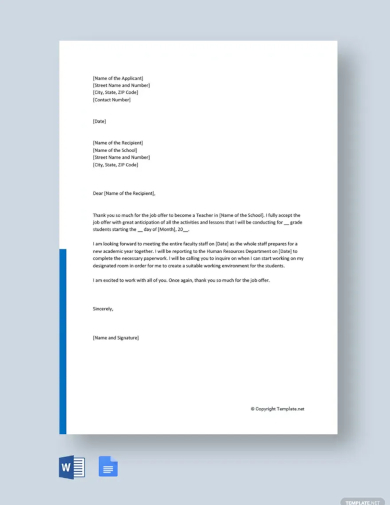
Job Acceptance Letter Template
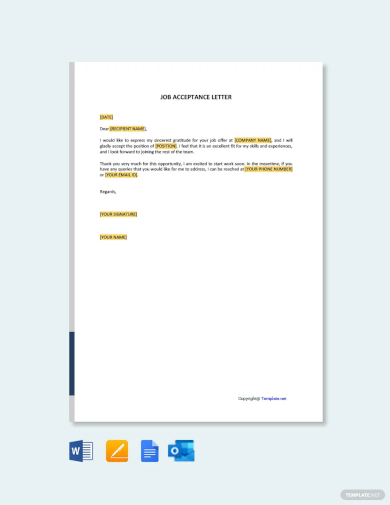
Internship Acceptance Letter from Employer Template
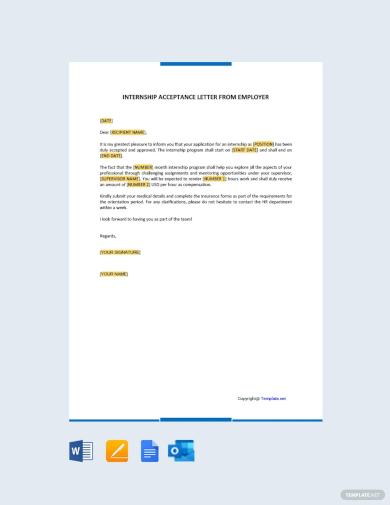
Free Internship Acceptance Letter from Company to University Template
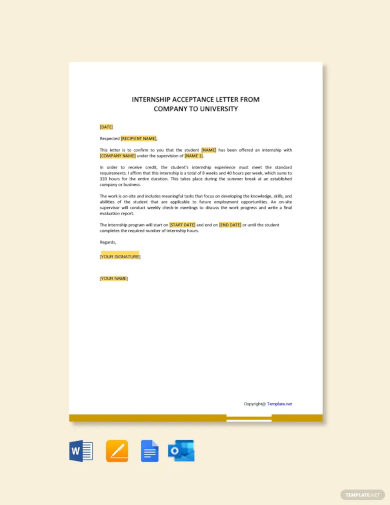
Free Resignation Acceptance Letter With Immediate Effect Template
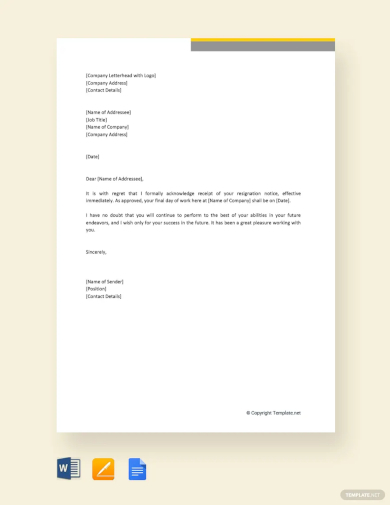
Business Termination Acceptance Letter Template
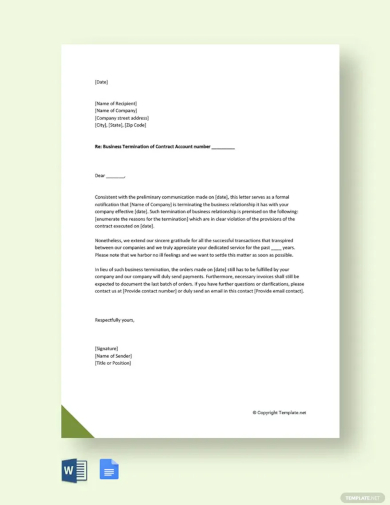
Nursing Job Acceptance Letter Template
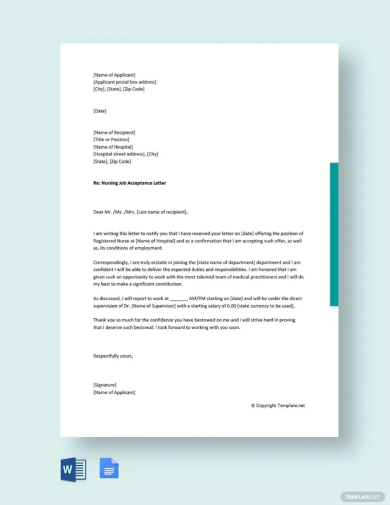
Employment Acceptance Letter Template
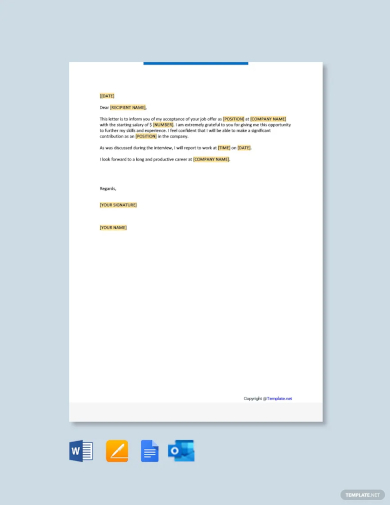
Types of Acceptance Letters
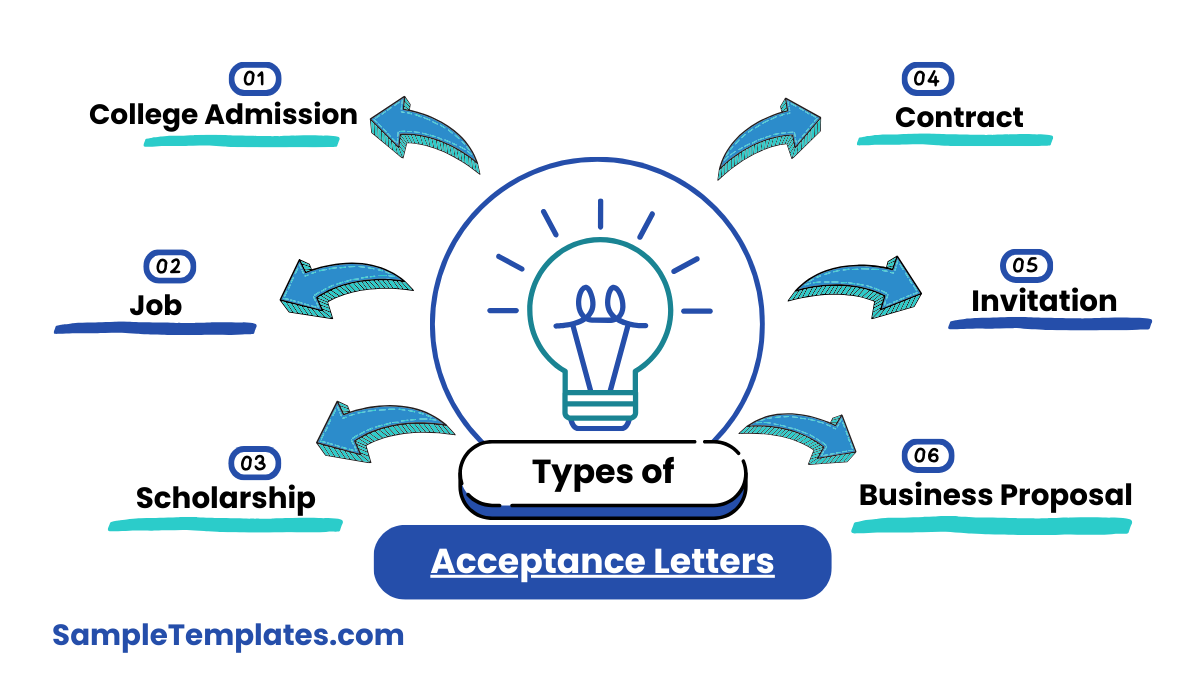
There are many types of acceptance letters, from resignation acceptance letters, proposal acceptance letters, and formal acceptance letters. We offer many different kinds here on our website for you to see.
- Job Acceptance Letter – Written by a candidate to formally accept a job offer from an employer. It confirms the terms of employment, such as salary, benefits, and the start date.
- College Admission Acceptance Letter – Sent by prospective students to a college or university to accept an offer of admission and confirm their intent to enroll in the institution.
- Scholarship Acceptance Letter – A letter sent by a scholarship recipient to the granting organization or institution to formally accept the scholarship and express gratitude.
- Business Proposal Acceptance Letter – Written by a business or individual to accept a business proposal from another party, confirming terms and conditions of the agreement or partnership.
- Contract Acceptance Letter – This letter is used by a contractor or service provider to accept terms and conditions of a contract for a project or job, confirming details like scope of work, payment terms, and timelines.
- Real Estate Offer Acceptance Letter – Written by a buyer or seller in a real estate transaction to formally accept an offer or counteroffer, outlining the terms of the purchase or sale.
- Invitation Acceptance Letter – Sent in response to an invitation to an event, such as a conference, wedding, or formal gathering, indicating the recipient’s intention to attend.
- External Examiner Acceptance Letter – Used by an academic professional to accept the role of external examiner at another educational institution, detailing their responsibilities, term of appointment, and any other relevant information. You can also see more on Settlement Acceptance Letter.
Most times, there are two types of acceptance letters in general. There are acceptance letters to welcome someone to a particular company or a particular school. There are also acceptance letters for certain jobs, such as school projects scope. It can be important to know what type of acceptance letter you need exactly before you make one.
Free University Acceptance Letter Template
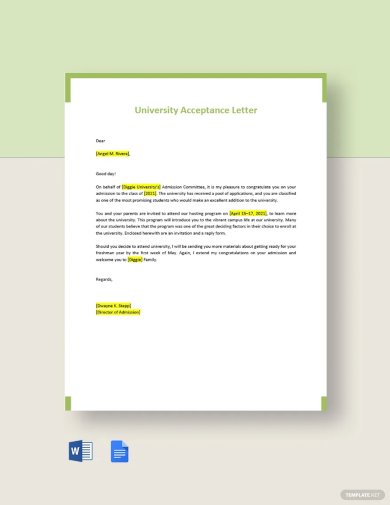
Thank You Letter after Job Acceptance Template
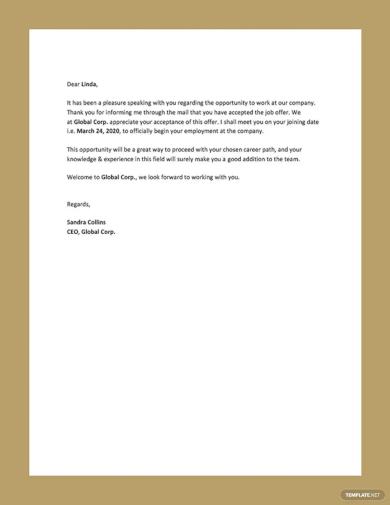
Free Request For Resignation Acceptance Letter Template
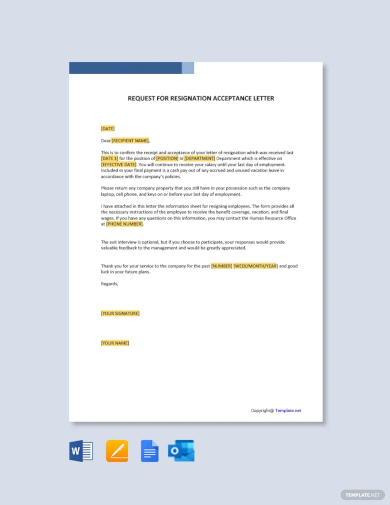
Construction Letter of Acceptance Template

Resignation Acceptance Letters Template
Employee Resignation Acceptance Letter Template
Director Resignation Acceptance Letter Template
Sample Job Acceptance Letters Template
Teaching Job Acceptance Letter Template
Formal Job Acceptance Letter Template
Simple Job Acceptance Letter Template
Writing an Acceptance Letter
Writing an acceptance letter is a fairly easy thing to do, right? All you have to do is say, “You’ve been accepted!” and then leave it at that. However, there can be more aspects to an acceptance letter that you’re simply not seeing yourself.
It can be important to include information regarding what the individual being accepted is for. It could be an acceptance to a job, to a certain academy, or an acceptance of sample contract. Whatever the case, including the details of what is being accepted is fairly important. You wouldn’t want the recipient to be confused, would you?
Although, that can go without saying, this can be important since an acceptance letter is usually meant to be professional. Details are necessary for the letter being sent out. Such details include what time the person accepted should arrive and on what date, what to wear for the job, etc. You can also see more on Employment Acceptance Letter.
If you need any more samples of acceptance letters that you can’t find on this list, feel free to check out our acceptance letters in PDF format.
Why Should You Use Acceptance Letters?
Acceptance letters are good for giving information to those who have been accepted. They can be rather heartwarming to receive for many. After all, who doesn’t want to be accepted? Acceptance letters writing can help you deliver that feeling of joy when one gets accepted.
There are many kinds of important acceptance letters that you can use such as job acceptance letters. Acceptance letters can help you give out information regarding what is expected of those who are accepted and make them feel happy that they have been accepted.
Contract Acceptance Letters Template
Employment Contract Acceptance Letter Template
Company Contract Acceptance Letter Template
Offer Acceptance Letters Template
Job Offer Acceptance Letter Template
Offer Acceptance Letter Format
Project Acceptance Letters Template
Construction Project Acceptance Letter Template
Formal Project Acceptance Letter Template
How to Make a Heartwarming Acceptance Letter
If there is one thing about acceptance letters that makes them special, it’s their ability to make someone feel happy that they’ve been accepted. It may seem a little odd to consider one’s happiness when receiving an acceptance letter, but it will make them all the more excited to do better when the day comes for them to work schedule.
Be sure to congratulate them for being accepted if you’re accepting someone to either a workforce analysis or as a student for an academy. If you’re writing each letter individually unique, you can write an acceptance letter based on what made the individual accepted in the first place. You can be sure to commend them for that.
The Effects of an Acceptance Letter
In relation to the above, you could ask yourself why you would bother putting effort into the letter format to make the person accepting feel good about himself. Well, the better the welcome you have for the newbie, the better effort they’ll do on their first day. It will also help to improve the overall image of you to give an acceptance letter to someone.
The best way to make an effective acceptance letter is to find a way to balance it between being welcoming and professional. Most acceptance letters are made to be professional—as they usually mean someone got accepted into work or received scholarship essay.
Scholarship Acceptance Letters Template
University Scholarship Acceptance Letter Template
College Scholarship Acceptance Letter Template
Internship Acceptance Letters Template
Student Internship Acceptance Letter Template
Summer Internship Acceptance Letter Template
Quotation Acceptance Letter Template
Price Quotation Acceptance Letter Template
Agreement Acceptance Letters Template
Employment Agreement Acceptance Letter Template
Lease Agreement Acceptance Letter Template
How Important Can It Be to Word Your Acceptance Letter Right?
Making an acceptance letter is more than just saying “You’re accepted!” and leaving it at that. Acceptance letter can also be used as a means to negotiate terms, more especially in the world of business agenda.
When you are making an offer acceptance letter, you need to find the right words to be able to modify the offer to suit yourself and the other party. Knowing how to do this can be tricky for many, but it is achievable. For example, if you’d like to accept an offer from someone else, but only in specific conditions, you have to find a way to word it so that you don’t seem too pushy but can convince the other party to give you what you want.
What Not to Do When Making Your Acceptance Letter
An acceptance letter is usually professional in nature. It is best not to make your acceptance letter so casual, but still make it friendly and welcoming at the same time. You shouldn’t use jargon or slang when writing your acceptance letter, and this can go without saying.
It isn’t too hard to make an acceptance letter in general, really. So long as you take careful consideration into what you are writing exactly.
We have many acceptance letters here on our website that you can use. We also have a list for internship acceptance letters for you should you be interested.
Business Acceptance Letters Template
Business Partnership Acceptance Letter Template
Bank Acceptance Letters Template
Bank Loan Acceptance Letter Template
Bank Audit Acceptance Letter Format
Bank Job Acceptance Letter Template
Contract Acceptance Letter Template
Contract Extension Acceptance Letter Template
Sample College Acceptance Letter Template
College Admission Acceptance Letter Template
Employee Acceptance Letter
Employee Termination Acceptance Letter Template
Employee Joining Acceptance Letter Template
Employee Redundancy Acceptance Letter Template
Invitation Acceptance Letters Template
Interview Invitation Acceptance Letter Template
Wedding Invitation Acceptance Letter Template
Seminar Invitation Acceptance Letter Template
Sample Joining Acceptance Letters Template
Job Joining Acceptance Letter Template
Joining Acceptance Letter Format
Loan Acceptance Letters Template
Loan Application Acceptance Letter Template
Loan Acceptance Letter Format
Leave Acceptance Letters Template
Maternity Leave Acceptance Letter Template
Parental Leave Acceptance Letter Template
Vacation Leave Acceptance Letter Template
Sample Marriage Acceptance Letters Template
Marriage Proposal Acceptance Letter Template
Marriage Invitation Acceptance Letter Template
Meeting Acceptance Letters Template
Formal Meeting Acceptance Letter Template
Meeting Acceptance Letter Format
Order Acceptance Letter Template
Purchase Order Acceptance Letter Template
Proposal Acceptance Letters Template
Project Proposal Acceptance Letter Template
Salary Proposal Acceptance Letter Template
Sample Promotion Acceptance Letters Template
Job Promotion Acceptance Letter Template
Promotion Acceptance Letter Format
Product Acceptance Letter Template
Product Acceptance Letter Template
School Acceptance Letters Template
High School Acceptance Letter Template
Medical School Acceptance Letter Template
Graduate School Acceptance Letter Template
Law School Acceptance Letter Template
Tender Acceptance Letters Template
Tender Acceptance Letter Template
Tender Offer Acceptance Letter Template
Transfer Acceptance Letter Template
Job Transfer Acceptance Letter Template
Volunteer Acceptance Letters Template
Volunteer Resignation Acceptance Letter Template
Volunteer Work Acceptance Letter Template
Why You Should Use These Acceptance Letter Samples That We Offer
Making an acceptance letter overall isn’t really all that difficult. But you could take cues from the samples that we’ve provided to better improve the quality of your acceptance letter. It won’t take much of your time and can be valuable information to know just how an acceptance letter is formatted.
This list isn’t the only help we provide when it comes to sample acceptance letters. We also have these acceptance letters in PDF format should you be interested in more samples.
We hope that this sample list helped you find what you need! We are always here to offer more support in case you ever need us.
What happens after you get an acceptance letter?
After receiving an acceptance letter, you should confirm your decision, complete any necessary paperwork, fulfill prerequisites, and prepare for the next steps in your employment, education, or event attendance. You can also see more on Business Proposal Acceptance Letter.
Should you reply to an acceptance letter?
Yes, you should reply to an acceptance letter to confirm your acceptance, express gratitude, clarify any doubts, and acknowledge understanding of the terms and conditions provided.
How do I end an acceptance letter?
End an acceptance letter with a formal closing, such as “Sincerely” or “Warm regards,” followed by your name, signature (if it’s a printed letter), and your contact information if needed. You can also see more on College Acceptance Letter.
What is the letter of offer and acceptance?
A letter of offer and acceptance is a document in which one party outlines the terms of an agreement or job offer and the recipient formally accepts, establishing a binding agreement.
What is the reason for letter of acceptance?
A letter of acceptance formally acknowledges receipt and agreement to the terms of an offer, whether for a job, school admission, or contract, and it initiates the start of that agreement or engagement. You can also see more on Scholarship Acceptance Letter.
We are pleased to inform you of your acceptance. Congratulations on this achievement! We look forward to welcoming you and supporting your success. Please review the attached details and respond with your confirmation at your earliest convenience.
Related Posts
Resignation Letter for Medical Samples & Templates
Letter of Intent Samples & Templates
Letter of Intent for a Job Samples & Templates
Lease Proposal Letter Samples & Templates
Letter of Inquiry Samples & Templates
Character Reference Letter Samples & Templates
Claims Letter Samples & Templates
Response Letter Sample & Templates
Follow Up Letter Samples & Templates
Sample Project Proposal Letter Templates
Donation Letter Samples & Templates
Addressing a Formal Letter Samples & Templates
Grievance Letter Samples & Templates
Sample Sponsor Thank You Letter Templates
Sample Letters of Request
